Deji Elumoye in Abuja, Nume Ekeghe, Dike Onwuamaeze and Sunday Ehigiator As

High

Deji Elumoye in Abuja, Nume Ekeghe, Dike Onwuamaeze and Sunday Ehigiator As

High
Chuks Okocha and Adedayo Akinwale in Abuja
The Peoples Democratic Party (PDP) may be heading for yet another storm as Enugu State Governor, Peter Mbah appears to have finalised moves to defect to the ruling All Progressives Congress (APC) next week.
The Chairman of Enugu State APC caretaker committee, Dr. Ben Nwoye, disclosed this yesterday, in Abuja, after the inauguration of his committee by the National Chairman of the party, Prof. Nentawe Yilwatda.
But in a swift reaction, the National Publicity Secretary of the PDP, Debo Ologunagba, urged members of the party to stay focused, adding, ''we recognise that, and we just
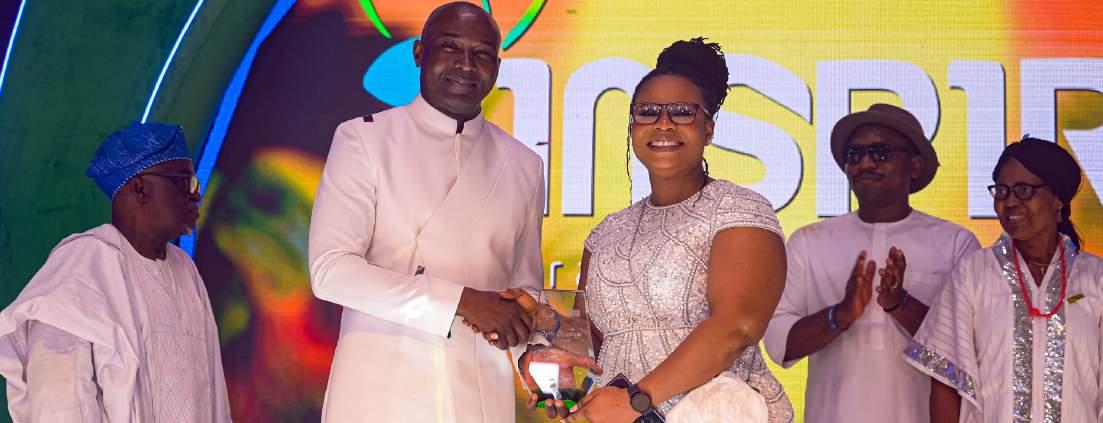
Akachi









Kunle Adwale
The Super Eagles of Nigeria yesterday defeated Lesotho 2-1 in one of the Group C World Cup Qualifying matches at Peter Mokaba Stadium in Polokwane, South Africa.
The goals came from the team’s Captain, William Troost-Ekong and debutant, Akor Adams, in an encounter that was far from convincing but secured an important win as rival, South Africa dropped points.
The Super Eagles now have a fighting chance as they look to come from behind to secure a place at the 2026 World Cup. They came into yesterday’s three points shy of Benin and South
want to tell our members, stay focused, and don't fret. Don't be afraid. We're moving ahead as a party, and we'll do well."
The likely move by Mbah, coming amid deepening cracks within the leading opposition party, has sent shockwaves through its ranks in the SouthEast. With Mbah’s exit looming, the PDP’s grip on the region appears to be slipping faster than ever.
Following Thursday’s dissolution of the State Working Committee of the APC in Enugu, Mbah is expected to defect to the APC next Tuesday. Mbah is expected to join the ruling party alongside elected national and state legislators, members of the state executive, and party leaders from ward and local government levels across the state.
THISDAY learnt that the failure of the PDP to ratify Hon. Sunday Udeh-Okoye as South East’s choice to complete the remaining tenure Senator Samuel Anyanwu, who had won the party’s ticket and flew the party’s flag in the November
Nigeria (SAN), for the position of Chairman of the Independent National Electoral Commission (INEC).
Stakeholders across the political, civic, and governance spectrum are already outlining key reforms they believe should define his tenure. From restoring public trust to deepening electoral transparency, many say Amupitan must move swiftly to
Africa, who sat second and third in the group.
Nigeria opened the scoring in the 55th minute when TroostEkong converted a penalty, giving the visitors the advantage.
The Super Eagles continued to press and control possession, and their efforts were rewarded in the 80th minute when Akor Adams doubled the lead.
At that stage, Nigeria looked comfortable, appearing to have a firm grip on the match.
However, Lesotho refused to go down without a fight as Hlompho Kalake pulled a goal back in the 83rd minute, giving the hosts a lifeline and adding tension to the closing stages.
Despite Lesotho’s late push,
2023 Imo governorship election, which had pitted the party and its South East caucus, was one of the reasons for Mbah’s probable defection.
In their communique after the South East Zonal Executive Committee (ZEC) meeting at Government House, Enugu, on May 14, the South East PDP had warned that it was fed up and might leave the party if it failed to ratify Udeh-Okoye as the National Secretary for the umpteenth time.
“In the event that our position is not promptly implemented by the party, the South East PDP, as a family, will be compelled to reconsider our relationship with the PDP going forward,” the communique read by the South East Zonal Chairman of the party, Chief Ali Odefa had stated.
On the occasion, former Senate President and Chairman of PDP Board of Trustees , Senator Adolphus Wabara, had decried the trampling of South East PDP despite the region’s loyalty to the party since its formation in 1998.
rebuild confidence in Nigeria’s electoral system.
This comes as the Peoples Democratic Party (PDP) and a civil society group, Situation Room, yesterday, challenged the Senate to ensure a transparent confirmation process, warning that Nigerians and the international community are watching how the confirmation would be handled.
Nigeria held on to secure the 2-1 win.
The match lacked intensity for long periods, with both sides struggling to create clear-cut
chances until the second half.
Nigeria’s early dominance and clinical finishing proved decisive, while Lesotho’s late goal was not enough to alter
the outcome.
This was expected to be a routine outing for the Super Eagles, but, in reality, it was anything but. The Nigerian
team was thoroughly uncreative in the first half, resorting to long balls with limited effect as they struggled to break down their hosts.
Ndubuisi Francis in Abuja
The federal government declared yesterday that there was no policy change regarding the deduction of costs of collection at source by revenue-generating agencies.
In a statement issued by the Director, Information and Public Relations, Ministry of
Speaking further, Nwoye stated: “For the past 10 years, Enugu State has remained in opposition. But all that will change on Tuesday, the 14th of October, 2024, when the governor will be declaring for APC.
“And the Governor is not coming alone. The Governor is coming in with 260 ward councillors. They will be declaring with the Governor. He will be coming in with the 24 members of House of Assembly. He will be coming in with members of the National Assembly. He will also be coming with the entire Exco.”
Earlier, Yilwatda told members of the caretaker committee that he understood the fact that they would have to rebuild the party in the state.
His words: “We know the challenges that we're in, the need to rebuild the party, to keep the party, to refocus the party, to ensure that the party expands. Expansion in terms of membership.
“We want to see the number of people that
Also yesterday, the erstwhile coordinator of President Bola Tinubu legal team at the 2023 presidential election tribunal, Mr. Babatunde Ogala, debunked the involvement of Amupitan, in the defense of the president's victory at the 2023 general elections.
Amupitan's nomination was approved yesterday by the Council of State.
THISDAY also gathered that
Finance, Mohammed Manga, the government said it had not discontinued the practice of allowing revenue-generating agencies such as the Federal Inland Revenue Service (FIRS), Nigerian Upstream Petroleum Regulatory Commission (NUPRC), and the Nigeria Customs Service (NCS) to deduct
we have in APC increase under your leadership. Not forgetting the members that we have in APC. You can't throw away what you have because you want to go and get what you don't have. We must maintain our members, who have laboured, who have suffered, who have built the party, who have sustained. We are the building block of the party. We must be sustained, we must be kept, we must be nurtured, we must be honoured. That's what keeps this party together.
“Secondly, APC is a home to all. The person who came yesterday, the person who came today, the person who will come tomorrow, and the person who will come next tomorrow will have equal rights and equal access, based on our Constitution.
“The NWC has to follow due process in dissolving the state's working committee. Ensure that all legal processes are followed. “
The chairman added that ahead of the 2027 elections, the
Tinubu has sent his name to the Senate for confirmation.
Amupitan’s nomination for the position coincides with the ongoing for forthcoming off season elections.
His immediate task, if screened and confirmed by the Senate this month, would be to conclude the preparation for the conduction of the Anambra State Governorship election scheduled for November
their costs of collection at source.
The clarification, it said, became necessary to address recent media reports suggesting that the federal government had discontinued the practice.
The statement read: "The Federal Ministry of Finance wishes to address recent media reports suggesting that the Federal Government has discontinued the practice of allowing revenuegenerating agencies such as the Federal Inland Revenue Service (FIRS), the Nigerian Upstream Petroleum Regulatory Commission (NUPRC), and the Nigeria Customs Service (NCS) to deduct their cost of collection at source.
ruling party wants to ensure that it records overwhelming success.
But reacting to the likely defection by the Enugu State Governor, Ologunagba said, “We've gone through this way before, but the foundation of the PDP is strong, solid and based on the people. And that's why we have reasons to believe that we are the only truly democratic party in this country, that is based on ideas, that is based on convictions, and is based on policies.
''It's on record here in this country that vice-presidents of this country left this party. We have presidents from this country, under this platform, that have shown interest of leaving the party. But the party remains. So that is the message to Nigeria.
''This is a party built on ideals, and those ideals are based on the people. And that's why every day Nigerians are excited about what we're doing.
You come into this secretariat every day, you see a lot of people, people that are not
8.
This would be followed by the Area Council elections in the Federal Capital Territory (FCT) in February 2026; the Ekiti State Governorship election scheduled for June 2026; while Osun State Governorship election would be held August 2026.
But reacting to Amupitan's appointment, a group, Vanguard for Credible Representation, said
even party members.
“So you ask if we're concerned, yes, we're concerned as a political party, but we are not deterred. Because, like I said, and I will refer to that again, the train for the 2025 elective convention of the PDP figuratively has arrived at the Ibadan.
''The defections that you see, if you want to go Biblical, it says, the Egyptians you see today, you see them no more. The APC that is orchestrating all of this, through intimidation, through coercion, through blackmail, by 2027, Nigeria shall see them no more.
“'So that's where I'll end with that question. Nigerians know that the PDP is actually their hope, and we're excited with the enthusiasm and the kind of feedback we get before we do a particular reference to our convention.
“So we just want to tell our members, stay focused, and don't fret. Don't be afraid. We're moving ahead as a party, and we'll do well. '', the PDP spokesman stated
while his appointment should have elicited jubilation, times have shown that people do change.
Its Executive Director, Akinloye Oyeniyi, told THISDAY that he hoped Amupitan practices or executes all his fine recommendations on electoral rule he had canvassed for.
Continued on page 10
the President, Senator Oluremi Tinubu, charged Nigerians to give necessary support to girls in the bid to attain their maximum potential.
In a message yesterday, to mark the 2025 International Year of the Girl-Child, the First Lady also tasked Nigerian parents to remember the daily hustle of the girls.
Mrs Tinubu, in the fourparagraph message stated, inter alia:
"Today, on International Day of the Girl Child, with the theme: “The Girl I am, The Change I lead: Girls on the Frontlines of Crisis,” let us
remember the daily struggle of our girls.
"To every brave girl, striving to reach the classroom, walking miles for water, or carrying the quiet strength of displacement, you are seen, you are heard and valued. Your courage lights the way to a brighter future.
"Let us come together to support our girls to reach their maximum potential. Happy International Day of the Girl Child 2025."
Meanwhile, the women that spoke with THISDAY, included the Director General of Lagos Chamber of Commerce and Industry (LCCI), Dr. Chinyere
Almona; Managing Director/ CEO of Starzs Investments Company Limited and a Member of the Governing Board of the Nigerian Maritime Administration and Safety Agency, Iroghama Ogbeifun; CEO of LemonLime Nigeria Limited, Abiola Yahaya; CEO of Kayque Global, Kemi Quadri; CEO of Tedell Global Resources Limited, Adegbenro Della Ade-Aduke; and Founder of EventzbyTeemah, Fatimah Mafe-Giwa, urged both government and private institutions to create systems that genuinely support women’s growth, rather than
merely celebrating them once a year.
The theme for this year is “The Girl I am, the Change I Need, and Girls on the Front Lines of Crises.”
Speaking with THISDAY, Almona, stressed the need to remove financial barriers for women, especially femaleowned businesses.
“That will mean that some of these schemes, like education loan should be implemented more broadly so that we can have real tangible results and it should also be inclusive.
“Sometimes when a household is faced with little
finance, it begins to prioritise who should go to school and who should not go. I also think that we need to make the school environment conducive for women.
“It should be free from gender based violence. The environment should be safe.
We should also have femalefriendly sanitation facilities. Thirdly, we need to think about how to integrate digital education and vocational skills early enough at primary and secondary school levels so that people can grow with it. That is developing girls not just for work workplace
but giving them live skills.”
The LCCI boss also urged women aspiring to leadership positions in business, public service, or entrepreneurship to, “Dream big, dream, dream, and do not stop dreaming. Secondly, is that they should not be afraid of who they are.
“A lot of girls have the skills and power to do so much, but they are curtailed by culture and even religion. And I will like to say to girls: build your skills because you have to present something to the world. Let their passions drive skill development.”


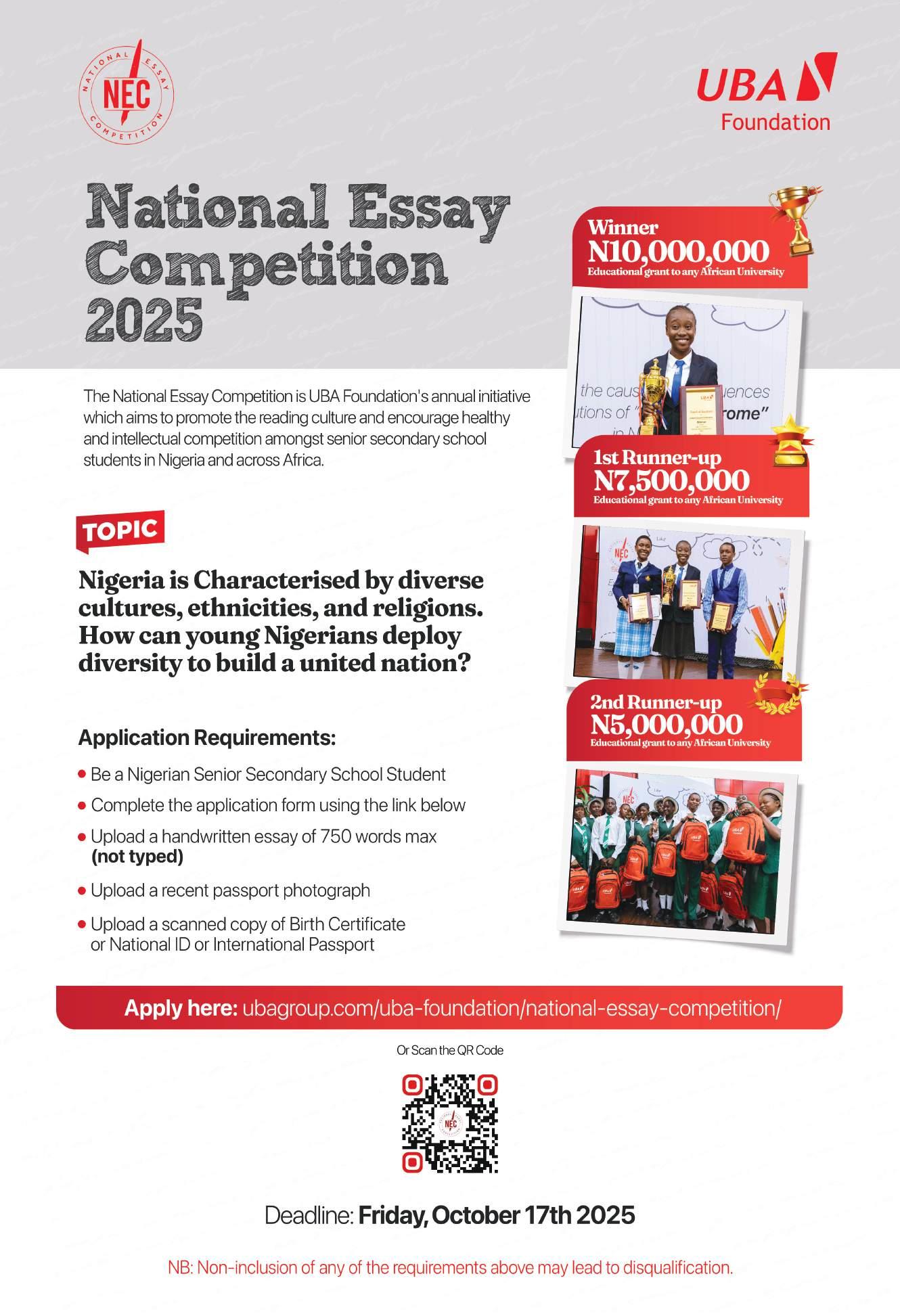

Emmanuel Ugwu-Nwogo in Umuahia
The federal government has been urged to muster the political will to free the third tier of government from the vice grips of state governors for democracy to thrive at the grassroots.
The call was made by civil society organisations (CSOs) and participants in a workshop held in Umuahia, the Abia State capital, to strengthen the capacity of LG workers to operate efficient and transparent grassroots administration.
Even with the Supreme
James Sowole in Abeokuta
Utica Capital Limited has launched a N20 billion closedended venture capital fund to accelerate investment and deepen the growth of Nigeria film industry.
According to the company, the venture capital registered and approved by the Securities and Exchange Commission (SEC) of Nigeria aims to reduce the N200 billion funding gap in Nigeria’s movie industry.
Chairman, Utica Capital, Adesegun Akin-Olugbade, while speaking at the launch of the initial N5 billion tranche of Series 1 of the Utica Film Fund said the fund was released to boost the competitiveness of the country’s film industry at the global level.
“Nollywood is more than entertainment. It is a cultural
powerhouse, a billion-dollar industry, and one of Nigeria’s greatest exports to the world.
Every day, over 35 million people consume Nollywood content.
Our films travel across borders, shape perceptions of Africa, and provide livelihoods for millions. Yet, for too long, this industry has been underfunded, relying on personal savings, informal loans, and small-scale investors,”
Akin-Olugbade said.
He added, “We are not just launching another investment product; we are making history.
For the very first time in Nigeria, and indeed in Africa, the Securities and Exchange Commission has approved a specialised Venture Capital Fund dedicated to the film industry. The Utica Film Fund is, therefore, a pioneer, blazing the trail where finance and creativity intersect.
Court judgement which declared governors' confiscation of council funds illegal, the state chief executives have shown no sign of relaxing their stranglehold of their respective LGs.
"Beyond executive orders and court pronouncements, the federal government must demonstrate political will to fully restore LG autonomy," the CSOs said in a communique issued at the end of the October 1, 2025 workshop.
The participants faulted the provision for the Joint Accounts Allocation Committee (JAAC)
in the 1999 Constitution, saying that it was "enabling state-level hijack of funds" thereby crippling the LGs.
According to the CSOs, the federal government could engender full autonomy of LGs by pushing for "speedy and singular amendment of 1999 Constitution to abolish JAAC and empowering INEC (instead of State Electoral Commissions) to conduct LGA elections."
"Restoring LGAs as a functional third tier will strengthen accountability, local development, and democracy," the participants stated in their
communique.
Though the implementation of full autonomy of the local government system appears to be dragging on, the CSOs expressed optimism that it would eventually happen sooner than expected following the ongoing constitutional amendments.
It was in preparation for the full political and economic autonomy of the 774 LGs that the training programme was organised by the Nigeria Civil Society Situation Room (Situationroom) in partnership with Citizens Centre for
Integrated Development and Social Rights (CCIDESOR). The funding support was provided by the Foreign, Commonwealth and Development Office (FCDO) UK.
Themed ‘Economic Literacy and Budget Accountability: A Prelude to Local Government Political and Financial Autonomy’, the training programme brought together over 40 participants including planning and accounts staff of Abìa LGs, and members of the Nigerian Union of Local Government Employees (NULGE).
Former presidential candidate of the African Action Congress and human rights activist, Omoyele Sowore, yesterday, disclosed that former President Goodluck Jonathan has agreed to meet with President Bola Tinubu over the continued detention of the leader of the Indigenous People of Biafra (IPOB), Nnamdi Kanu.
Sowore who disclosed this in a post on his X handle after
PDP to Senate: Don’t Rush Amupitan’s Confirmation
The PDP yesterday, challenged the Senate over the nomination of Amupitan (SAN) as Chairman of INEC, warning that Nigerians and the international community are watching how the confirmation would be handled.
The opposition party said the Senate must not ‘rubber-stamp’ the nomination, stressing that the credibility of Nigeria’s electoral process, already under public suspicion after the 2023 general elections, now hangs on how
transparently the upper chamber manages the confirmation hearing.
The PDP’s National Publicity Secretary and Secretary of the National Convention SubCommittee on Media and Publicity, Mr. Debo Ologunagba, made the remarks in Abuja, shortly after the inaugural meeting of the Venue Sub-Committee for the PDP 2025 Elective National Convention, chaired by Dr Adebayo Lawal, Deputy Governor of Oyo State.
Amupitan Not Part of Tinubu's Presidential Election Legal Team, Ogala Clarifies
A Senior Advocate of Nigeria, Mr Babatunde Ogala, yesterday, debunked the involvement of Amupitan, in the defense of the president's victory at the 2023 general elections. Ogala, in a statement, described as "false and misleading" viral claims on social media that Amupitan was a member of the Tinubu Presidential Legal Team. In the statement titled, "RE: False Claims Linking the Newly Appointed INEC Chairman, Prof. Joash Amupitan, SAN to the Tinubu Presidential Legal Team,” Ogala stated that as
a meeting with Jonathan in Abuja, said they discussed the urgent and compelling need to resolve Kanu’s case.
The activist wrote: “Earlier today in Abuja, I met with former President @GEJonathan (Goodluck Jonathan) to discuss the continued incarceration of Mazi @NnamdiKanu.”
Sowore said Jonathan welcomed the need to address Kanu’s case in the interest of justice and national unity.
He added, “President
the erstwhile coordinator of the legal team, "I feel compelled, not as a rejoinder, but in service to truth and public interest, to set the records straight and allay any concerns these malicious fabrications may hove caused among well-meaning Nigerians."
While stressing that Amupitan, "was never, at any point, a member of the Tinubu Presidential Legal Team,” the coordinator maintained that Amupitan's name, "does not appear among the over One Hundred and Twenty-three legal practitioners who were formally engaged for that assignment, of
Jonathan agreed that there is an urgent and compelling need to address this matter decisively and justly. I thank him sincerely for recognising the importance of resolving Kanu’s case in the interest of peace, fairness, and national healing.
“Particularly assuring was that he promised to meet @ officialabat (President Bola Tinubu) to discuss this issue as soon as possible.”
Sowore further stated that
whom sixty were distinguished Senior Advocates of Nigeria."
Besides, the senior lawyer stated that there was no time during the entire process during which Amupitan's counsel, opinion, or professional service was sought or rendered.
"I therefore challenge anyone peddling this falsehood to produce verifiable evidence to the contrary.
In fact, any member of the public may apply for Certified True Copies of all legal processes filed on behalf of the President-Elect (as he then was) to confirm the authenticity of this statement.
"While political discourse is
Jonathan’s intervention adds to the growing voices calling for Kanu’s release.
“A list that already includes ex-Vice President @atiku, Femi Falana SAN, Senator @ ShehuSani, and many others across political and regional divides,” he said. He added that the IPOB leader “remains in detention today because he took up the just cause of confronting the long-standing issue of marginalisation in Nigeria.”
inevitable in any democracy, it is essential that our engagement remains anchored on truth, decency, and national stability", Ogala added.
The coordinator, while observing that deliberately twisting facts to inflame public sentiment serves no one and only endangers the collective peace, emphasised that Tinubu has lawfully exercised his constitutional prerogative in making this appointment and that the Council of State had approved same.

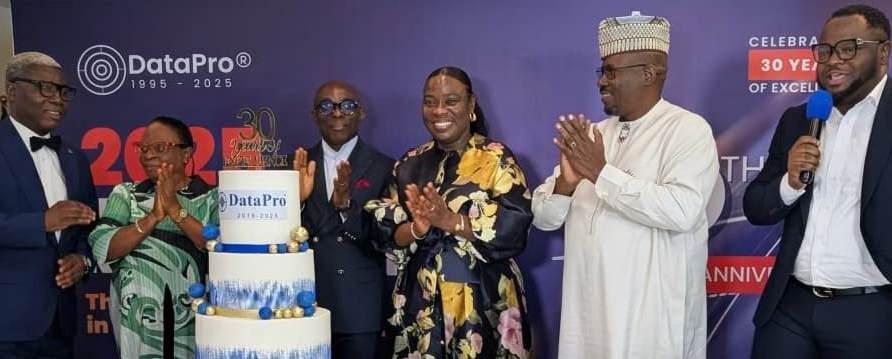
The federal government said it has approved the recruitment and deployment of over 20,000 health workers in federal government-owned health facilities across the country.
It also said that as part of implementation of the Sector-wide Approach (SWAP) reform initiative in the health sector, 69,000 frontline health workers have been retrained across all the 36 states of the federation.
In addition, the Nurses and Midwifery Council of Nigeria (NMCN) said that over 115,000 nurses and Midwives are presently
being produced annually in Nigeria.
Coordinating Minister of Health and Social Welfare, Prof. Ali Mohammad Pate, disclosed this while speaking at the ceremony marking the Roll-out of Nigeria's Strategic Directions for Nursing and Midwifery (NSDNM) in Abuja.
The five-year action plan which was unveiled yesterday in Abuja, contains a roadmap to strengthen healthcare delivery and transform nursing profession nationwide Pate said that nurses are at the core of people's care in hospital services in the country.
He said that federal
Army to counter terrorists' disinformation with AI technology, train PR officers, journalists in fact-checking
Four Nigerian soldiers were killed and five wounded when troops repelled a coordinated attack by Islamist insurgents in Ngamdu, northeastern Borno State, the military said yesterday.
Also, the Nigerian Army has taken progressive steps in countering terrorists' disinformation through Artificial Intelligence technology by training Army Public Relations Officers and journalists in the effective use of AI for factchecking claims, photographs, and videos.
Boko Haram and Islamic State West Africa Province have this year stepped up attacks on military bases in Borno State, the heartland of an insurgency that has killed thousands and
displaced about two million people in over a decade, according to Reuters.
In the latest attack late on Thursday, insurgents used rocketpropelled grenades, armed drones, and improvised explosive devices targeting military personnel and vehicles, a military spokesperson said.
Reinforcements from the 29 Task Force Brigade helped repelled the assault, which also damaged several Mine-Resistant Ambush Protected vehicles and gun trucks, the military added.
The insurgents planted multiple IEDs along the Ngamdu–Damaturu main supply route, temporarily halting movement. Military engineers later cleared three explosive-laden sites, reopening the route to military and civilian traffic.
government has "made deliberate investments on the health workforce, particularly in nursing and midwifery and other frontline workers, recognising the significant supply demand gap in our health labour market.
"This administration, under His Excellency, President Bola Tinubu has consistently demonstrated unwavering commitment to uplifting the nursing and midwifery profession.
"Ministry of Health and
Social Welfare in the past year has championed strategic expansion of nursing and midwifery education," he said.
On recruitment of health workers, Pate said, "The Director of Human Resources in the Ministry has been graciously authorised by His Excellency, the President, to accelerate recruitment waivers for health workers in federal facilities—at least 20,000 workers, 60 per cent of whom are in the nursing and midwifery professions.
This demonstrates that our efforts are not just about talk but about tangible action."
While explaining the policy objective, Pate said that it will "strengthen education, create dignified and rewarding career pathways through jobs, expand leadership opportunities and retain top talent within our health system to deliver services.
"It is a practical guide that will shape reforms, investments and innovations in nursing and midwifery
over the next five years, while also positioning Nigeria as a contributor to global health system resilience through skilled, motivated and equitably distributed workforce.
Pate, who said the President has granted waivers for the recruitment and deployment of over 20,000 health workers in federal facilities, disclosed that 60 per cent of them are to come from the nursing and midwifery profession because they're the front line.
Peter Uzoho in Lagos and Omon-Julius Onabu in Asaba
Dangote Petroleum Refinery has dismissed reports alleging that it was importing finished petrol with high sulphur content into Nigeria, describing the claims as false and misleading.
Also, the ever-busy River Niger Bridge connecting Delta and Anambra states yesterday witnessed heavy gridlock as thousands of protesters including students, youths, workers, market
women and a coalition of civil society organisations thronged the Asaba-Onitsha Bridgehead, to register their displeasure over what the termed an attempt by certain interested groups to sabotage the Nigerian economy particularly the oil industry.
In a statement issued yesterday, the company explained that as a world-scale complex refinery, it processes a wide range of crude oil and intermediate feedstocks, which is a standard global practice aimed
at optimising production and product quality.
“The cargo in question is an intermediate feedstock, not finished petrol.
“It will be fully refined in our processing units to meet both Nigerian and international quality standards," the company said.
Operating within a Free Trade Zone, Dangote Petroleum Refinery said it refines and sells only high-quality fuels that comply with all regulatory specifications. The company added that its exports of petroleum products to the United States and Europe, among the world’s most regulated markets, underscore its adherence to international benchmarks for quality and safety.
Dangote Refinery further noted that all imported feedstocks were accompanied by quality certificates, which were transparently shared with regulators.
President Bola Tinubu has rejoiced with Chief Executive of Interface Africa, Al'amin Muhammed Idris, on winning the NextGen Innovation Challenge.
Interface Africa, representing
Kaduna, won a cash award of £1.5 million at the challenge's grand finale, held on Thursday at the Hilton London Paddington.
The NextGen Innovation Challenge is a national initiative spearheaded by the National Board for Technology Incubation (NBTI) in partnership with
UKALD London. Inspired by President Bola Tinubu's Renewed Hope Agenda, the challenge is designed to unlock Nigerian youths' innovative potential
The President, in a release issued yesterday by his Adviser on Information and Strategy, Bayo Onanuga, commended Interface Africa for its effort in providing affordable solar financing to small businesses in Africa, noting that the cash award will support the company's mission to increase access to clean energy in underserved communities.

big one for the opposition...
WAhen President Muhammadu Buhari took over the reins of power on May 29, 2015, Nigeria was sadly a broken state in many respects. As a result of many other factors including bad governance and untold level of corruption, government could not live up to its financial obligations to citizens and service providers at both the federal and state levels.
Indeed one of the first official assignments that President Buhari carried out was the approval of billions of Naira in bailout funds to enable state governors pay something as basic as workers’ salaries. Granting those bailout funds was a huge boost to national security because the pressure of arrears of unpaid monthly salaries building dangerously all over the country was a ticking bomb.
rely on expensive generators. For small businesses and households, the cost of fueling these generators eats deep into income. Meanwhile, renewable energy opportunities remain largely untapped, even though solar and wind could help close the gap. Without reliable power, the dream of industrial growth will remain a mirage.
Ask the naysayers and they would readily remind you of how long it took President Buhari to appoint his ministers and how that contributed to collapse of the economy as if, without ministers, governance was frozen. But buying that narrative would amount to what a famous Nigerian writer, Chimamanda Adichie, termed “the danger of a single story”. Yet the whole story was that many of our citizens did not know how decrepit a state President Buhari inherited in 2015.
cross Nigeria, the signs of a deep infrastructure crisis are impossible to ignore. From pothole-ridden highways and epileptic power supply to congested ports and inadequate rail networks, the country’s physical backbone is crumbling. While citizens struggle daily with the consequences, promises of massive infrastructure renewal have remained more rhetoric than reality. For a nation seeking to attract investment, create jobs, and lift millions out of poverty, the failure to provide reliable infrastructure is a heavy weight dragging progress backward.
It was therefore necessary for him to take stock against the background of the fact that the departing government did not, reportedly, cooperate full well with the incoming government in terms of leaving workable handover notes. Although President Goodluck Jonathan was gracious in defeat, many of his appointees were still sulking over what they saw as their personal losses and therefore pulled all the stops to make things difficult for the Buhari government.
The TSA policy, interestingly, was mooted by the PDP government but its penchant for imprudence and lack of accountability denied it the courage of implementing the policy. What the President literally did was to gather all the nation’s money into one box and locked it up with a big padlock and watched for any thief to come close.
Perhaps the most visible symbol of this crisis is Nigeria’s road network. Federal and state highways are riddled with potholes, many barely passable during the rainy season. Road accidents claim thousands of lives annually, many of them avoidable if proper maintenance were carried out. Truck drivers spend days stranded on roads leading to Lagos ports, creating bottlenecks that drive up the cost of goods. Rural communities remain cut off because feeder roads are either nonexistent or in terrible condition, preventing farmers from bringing produce to markets and worsening food insecurity.
Who can blame the President for almost developing paranoia over the safeguard of the national treasury with revelations and reports of mind-boggling looting that took place in the 16 years of the PDP? With such disclosures of how billions meant for fighting insurgency in the Northeast ended up in the pockets of a few individuals while our gallant soldiers fought with bare hands and on empty stomach, President Buhari was duty bound to bring sanity and accountability back in national spending.
The power sector tells a similarly grim story. Despite billions of dollars spent on reforms, Nigeria continues to generate far below the electricity its citizens need. Frequent blackouts cripple industries, forcing businesses to
by the EFCC, President Buhari by his action has successfully brought back to the public consciousness the need to treat public funds with the highest level of transparency and accountability.
Water and sanitation infrastructure are equally inadequate. Millions of Nigerians lack access to safe drinking water, relying instead on boreholes, wells, or unsafe streams. Urban centers face recurring water shortages, while sewage systems are either broken or nonexistent.
Even with the obvious and unpatriotic obscurantist behaviour of the PDP appointees and their supporters still in government hell-bent on making things difficult for Buhari, the President moved on with his methodical repair of a broken country. The first thing he did was to identify all possible sources of income to the nation and directed that all inflows be paid into one single account in line with the policy of Single Treasury Account (TSA).
TAfter keeping treasury looters on their toes and at bay through the EFCC, particularly, President Buhari moved to curb unnecessary spending habits of the nation on what economists call articles of ostentation. Part of the disclosures of the President’s stock taking was how the country frittered away billions in foreign currency by importing goods, which can be produced at home. One of such items was rice, a major staple among Nigerians. By banning rice importation into the country, the President on one hand had saved the nation billions in foreign currency annually.
o increase the internally generated revenue of Nasarawa Geographic Information Service (NAGIS), the former Governor of Nasarawa State, Governor Al-Makura appointed Mr. Sunny Agassi as the Director General of NAGIS.
TAnd, on the other hand, the President has boosted domestic production of rice and in the process had nudged the country into self sufficiency in food production. He also created millions of jobs for young people in the rice value chain.
What is most admirable about President Buhari and his government is its frugal management of scarce national resources to attain optimum goals.
Recall that since President Buhari stepped in the saddle, oil revenue dropped abysmally as if to sabotage him knowing all the big promises he made to citizens during his campaigns. But with the little resources that trickle in, the President is achieving what governments that received oil windfalls could not dream of.
Timothy Ali Samuel, Dept of Mass Communication, University of Maiduguri
Ainofenokhai Ojeifo, Abuja
THE SATURDAY NEWSPAPER
EDITOR OBINNA CHIMA
DEPUTY EDITOR AHAMEFULA OGBU
MANAGING DIRECTOR ENIOLA BELLO
THE SATURDAY NEWSPAPER
DEPUTY MANAGING DIRECTOR ISRAEL IWEGBU
EDITOR YEMI ADEBOWALE
CHAIRMAN EDITORIAL BOARD OLUSEGUN ADENIYI
DEPUTY EDITOR AHAMEFULA OGBU
EDITOR NATION’S CAPITAL IYOBOSA UWUGIAREN
MANAGING DIRECTOR ENIOLA BELLO
THE OMBUDSMAN KAYODE KOMOLAFE
he Advocacy for Alleged Witches (AfAW) urges the Nigerian public to stop ritual attacks and killings because the notion of ritual money and wealth is completely baseless. AfAW is making this call following the reported arrest of suspected ritualists in Oyo State in southern Nigeria. The local media reported that members of the Western Nigeria Security Network, Amotekun, arrested suspected ritualists with the body parts of a 73-year-old man.
Mr. Agassi repositioned and restructured the service by making land administration and registration to be computerised and automated; he digitised the entire process, including the Certificate of Occupancy (C of O) and other land documents. He made the agency’s activities to be governed by regulations, and ensured transparency of land matters and transactions. Agassi also ensured that the agency compiles and collates the goespatial information and other related data to create a comprehensive database for the state. He ensured that the service maintains a highly accurate base maps and aerial photography of the state, including detailed orthophotos for urban and rural areas.
Today, the trains are up and running daily from Abuja to Kaduna. And from Lagos to Ibadan a brand new rail track was started and completed; citizens are already commuting daily to and fro these two major cities in the country seamlessly as they reap from the dividends of democracy. And with the way this government is going, before 2023 when the President would leave, the entire country would be linked by rail with all of its economic advantages.
Mr. Agassi also made the agency to be official and sole source of GIS data for Nasarawa State. He ensured that the agency supports governance and planning. He provides administrative and technical supports for land related matters to government bodies and committees.
DEPUTY MANAGING DIRECTOR ISRAEL IWEGBU
CHAIRMAN EDITORIAL BOARD OLUSEGUN ADENIYI
EDITOR NATION’S CAPITAL IYOBOSA UWUGIAREN
MANAGING EDITOR BOLAJI ADEBIYI

THE OMBUDSMAN KAYODE KOMOLAFE
THISDAY NEWSPAPERS LIMITED
EDITOR-IN-CHIEF/CHAIRMAN NDUKA OBAIGBENA
GROUP EXECUTIVE DIRECTORS ENIOLA BELLO, KAYODE KOMOLAFE, ISRAEL IWEGBU
THISDAY NEWSPAPERS LIMITED
DIVISIONAL DIRECTORS SHAKA MOMODU, PETER IWEGBU, ANTHONY OGEDENGBE
EDITOR-IN-CHIEF/CHAIRMAN NDUKA OBAIGBENA
DEPUTY DIVISIONAL DIRECTOR OJOGUN VICTOR DANBOYI
SNR. ASSOCIATE DIRECTOR ERIC OJEH
ASSOCIATE DIRECTOR PATRICK EIMIUHI
DIRECTOR, PRINTING PRODUCTION CHUKS ONWUDINJO TO SEND EMAIL: first name.surname@thisdaylive.com What a waste!
Thus, under President Buhari, the Economic and Financial Crimes Commission (EFCC), which had remained comatose for years, was woken up to resume its duties. Apart from the trillions of Naira of looted funds and property recovered from corrupt politicians
GROUP EXECUTIVE DIRECTORS ENIOLA BELLO, KAYODE KOMOLAFE, ISRAEL IWEGBU, IJEOMA NWOGWUGWU, EMMANUEL EFENI
DIVISIONAL DIRECTORS SHAKA MOMODU, PETER IWEGBU, ANTHONY OGEDENGBE
DEPUTY DIVISIONAL DIRECTOR OJOGUN VICTOR DANBOYI
CONTROLLERS ABIMBOLA TAIWO, UCHENNA DIBIAGWU, NDUKA MOSERI
SNR. ASSOCIATE DIRECTOR ERIC OJEH
DIRECTOR, PRINTING PRODUCTION CHUKS ONWUDINJO
ASSOCIATE DIRECTOR PATRICK EIMIUHI
TO SEND EMAIL: first name.surname@thisdaylive.com
CONTROLLERS ABIMBOLA TAIWO, UCHENNA DIBIAGWU, NDUKA MOSERI
Anjorin Adeolu Joseph Lafia, Nasarawa State
AThe suspects, who were apprehended in the Boluwaji area in Ibadan, said that a Muslim cleric asked them to procure some human body parts for rituals. Ritual attacks are widespread in Nigeria. Irrational conceptions of how to make money or become wealthy and successful undergird these atrocities. Many Nigerians strongly believe in blood money, known in some local languages as Ogun Owo (Yoruba) or Ogwu ego (Igbo). They think that they could become rich, or successful through ritual sacrifice. Unfortunately, this is not the case. Ritual wealth has no basis in reason, science, or reality. Home movies known as Africa magic or Nollywood films have not helped matters. These movies continue to reinforce these mistaken notions and other superstitions. Families, churches, mosques, and other public institutions do not encourage the interrogation of these traditional occult beliefs. There are no robust efforts to criticize or dispel these irrational and paranormal claims in schools, colleges, and universities. So millions of Nigerians grow up blindly believing that they could make money through ritual sacrifice of human body parts. The belief has led many Nigerians to commit crimes and perpetrate atrocities. Many Nigerians have been jailed or are undergoing court trials due to ritualrelated attacks and murder.
simple measure of the quality of a newspaper, media outlet, or even YouTube site would be if they mention the winner of the Nobel Prize before one specific person who did get the award out of the 338 nominations. Most of the nominations were well deserved and the nominees might not even know they were recommended. Well done anyway.
Dennis Fitzgerald, Melbourne, Australia
Not too long ago, the police arrested some young Nigerians for stealing female pants, which they intended to use for ritual sacrifice. AfAW is asking all Nigerians to desist from ritual-related abuses because ritual money beliefs are baseless superstitions. Nigerian media, schools, and colleges should help educate and reorient the public. They should assist in reasoning Nigerians out of this killer-superstitious absurdity and nonsense. Leo Igwe directs the Advocacy for Alleged Witches (AfAW)

L-R: Lagos State Permanent Secretary, Ministry of Transportation, Mr. Wale Musa; Lagos State Commissioner for Transportation, Mr. Oluwaseun Osiyemi; General Manager, Lagos State Parking Authority (LASPA), Mrs. Adebisi Adelabu, and Executive Assistant to the Governor on LASPA, Mr. Deen Sanwoola, at the Y'2025 LASPA Staff Retreat, held in Lagos…yesterday
Sunday Ehigiator with agency report
Venezuelan opposition leader Maria Corina Machado, who lives in hiding, won the 2025 Nobel Peace Prize yesterday, for fighting dictatorship in the country, receiving the award despite U.S. President Donald Trump's repeated insistence he deserved it.
Machado, a 58-year-old industrial engineer, was blocked in 2024 by Venezuela's courts from running for president and thus challenging President Nicolas Maduro, who has been in power since 2013.
the Nobel Committee posted on social media.
“Oh my God ... I have no words," Reuters quoted Machado as having told the Secretary of the award body, Kristian Berg Harpviken, in a phone call which
"I thank you so much, but I hope you understand this is a movement, this is an achievement of a whole society. I am just one person. I certainly do not deserve it," she added.
Alex Enumah in Abuja
The President of the National Industrial Court of Nigeria (NICN), Justice Benedict Kanyip, labour leaders, university don and other key stakeholders have stressed the importance of fair labour practices in achieving peace and productivity at the workplace.
Kanyip spoke alongside National President of the Nigerian Labour Congress (NLC), Comrade Joe Ajaero, President, Trade Union
Congress (TUC), Comrade Festus Osifo and Prof. Ademola Popoola, of the Law Faculty, Obafemi Awolowo University, Ile-Ife, on Thursday in Abuja, at the 2025 Public Lecture of the NICN.
Setting the tone for discussion, the Industrial Court president, who identified the place of education in workplace harmony, lamented the poor understanding of labour laws by many employers and employees.
"We are covering the field right to interrogate the
principles of Labour justice and labour law education. Labour justice and labour law education are intertwined concepts," he said.
"While labour justice refers to the principles of fairness and equity in the workplace, encompassing the legal rights and protections afforded workers, labour law education involves the study and teaching of labour laws so as to ensure understanding and application of these principles by workers and employers, legal professionals and indeed
the society in general," he added.
Kanyip explained that education is crucial for promoting social justice and adherence to legal regulations like minimum wage, working conditions anti-discrimination laws and the general impact on the economy.
“Labour justice is a framework rooted in social justice, human rights and the rule of law, which aims to ensure fairness, dignified working conditions for all," Kanyip said.
The Executive Secretary of the Financial Reporting Council of Nigeria (FRC), Dr. Rabiu Olowo, has called on organisations to demonstrate their commitment to ethics and integrity through strong ethical leadership and good governance navigation.
Olowo made this call yesterday in Lagos in his address at the 20th Anniversary Corporate Governance Conference of the Society for Corporate Governance in Nigeria (SCGN) with the theme, ‘Strengthening Ethical Governance in a Disruptive World: Reflections of Governance Journey for a
Sustainable Future’.
He said, “With increasing complexity, uncertainty, and scrutiny, organisations must demonstrate their commitment to ethics and integrity, through strong ethical leadership and good governance navigation.
“This is not only a moral imperative but also a business imperative, as it
helps build trust, reputation, and long-term sustainability, hence strengthening ethical governance matters.”
He added that strengthening ethical governance is a collective responsibility and called on all stakeholders, including organisations, institutions and individuals to prioritise ethics and integrity.
The White House criticised the decision, just days after Trump announced a breakthrough in talks to halt the fighting in Gaza between Israel and Hamas.
"President Trump will continue making peace deals, ending wars, and saving lives... The Nobel Committee proved they place politics over peace," White House spokesperson Steven Cheung said in a post on X.
Maduro, whose 12 years in office have been marked by deep economic and social crisis, was sworn in for a third term in January this year, despite a six-month-long election dispute, international calls for him to stand aside and an increase in the U.S. reward offered for his capture.
"When authoritarians seize power, it is crucial to recognise courageous defenders of freedom
who rise and resist," the Norwegian Nobel Committee said in its citation.
It was not immediately clear whether she would be able to attend the award ceremony in Oslo on December 10. Should she not attend, she would join the list of Peace Prize laureates prevented from doing so in the award's 124-year-history, including Soviet dissident Andrei Sakharov in 1975, Poland's Lech Walesa in 1983 and Myanmar's Aung San Suu Kyi in 1991. Machado is the first Venezuelan to win the Nobel Peace Prize and the sixth from Latin America.
The United Nations human rights office welcomed the award to Machado as a recognition of "the clear aspirations of the people of Venezuela for free and fair elections."
Julius Berger Nigeria Plc recently held its annual Cultural Day celebration across its corporate offices, regional headquarters, and project sites nationwide.
The event once again highlighted the company’s commitment to promoting Nigeria’s rich cultural diversity as a vital tool for fostering unity, peaceful coexistence, and socio-economic development.
The Lord Mayor of Plymouth in England, Councillor Kathy Watkin has presented a Special Recognition Award to Nigerian-born broadcast journalist and host of African Vibe With Richybongo on CHBN Radio, Richard Edoki popularly known as Richybongo on behalf of Toskel Travels Limited and Toskel Community Heritage and Culture CIC.
inclusion, and unity through his radio show, African Vibe With Richybongo, bringing people together through rhythm, dance, and culture.
The award, according to the organisers, celebrates Richybongo's effort in promoting cultural diversity,
The presentation which was done at just-concluded Nigeria 65th Independence Day celebration in Plymouth, put together by Toskel Community Heritage and Culture CIC, in collaboration with Toskel Travels Ltd and Nigerians in Plymouth, brought together people from all walks of life to honour the Nigerian culture, creativity, and collective strength.
This year’s Cultural Day was marked by colourful displays of tradition, as staff turned out in vibrant attire representing Nigeria’s diverse ethnic groups. The celebration featured traditional music, dance performances, cultural exhibitions, and a showcase of indigenous cuisines, all reflecting the depth and richness of Nigeria’s heritage.
Ojomo said, “I can see some beautiful dresses this evening. I'm really impressed. Thank you very much for the effort. Definitely it is going to be a beautiful outing. Like I always say every year in year out, it's one of those moments where we get to celebrate our diversity.
“Yes, it's a period for some fun. However, most important thing here is we try as much to recognise that we're from different parts of the world, different parts of the country because we are as a company and that's our strength. It's very important to appreciate ourselves. So little things like this do matter a lot. So, to each and every one of you, I say welcome. Please do have a fantastic time here this evening. Thank you very much.”
In Abuja, the Head of Human Resources, Olorunfemi Ojomo, welcomed everyone and spoke about the importance of unity in diversity. He said that the company values the strength found in different cultures and will continue to promote it.
WITH heavy hearts, we honour
the indelible legacy of Chief Cornelius Adebayo, a beacon
o f m o r a l c o u r a g e a n d h u m i l i t y A s
Kwara’s governor, minister, and thought leader, he built bridges of unity, sowed seeds of progress, and championed the v o i c e l e s s H i s s t e a d f a s t s e r v i c e i n
N A D E C O , a s a f e d e r a l m i n i s t e r, a n d
A f e n i f e r e s t a l w a r t f o r t i fi e d N i g e r i a ’s democratic soul.
A t r u e s h e p h e r d , h e s e r v
h u
Though he rests now in eternal peace, his light shines on in our hearts.
Farewell, our hero. May God comfort his family and Kwara forever.
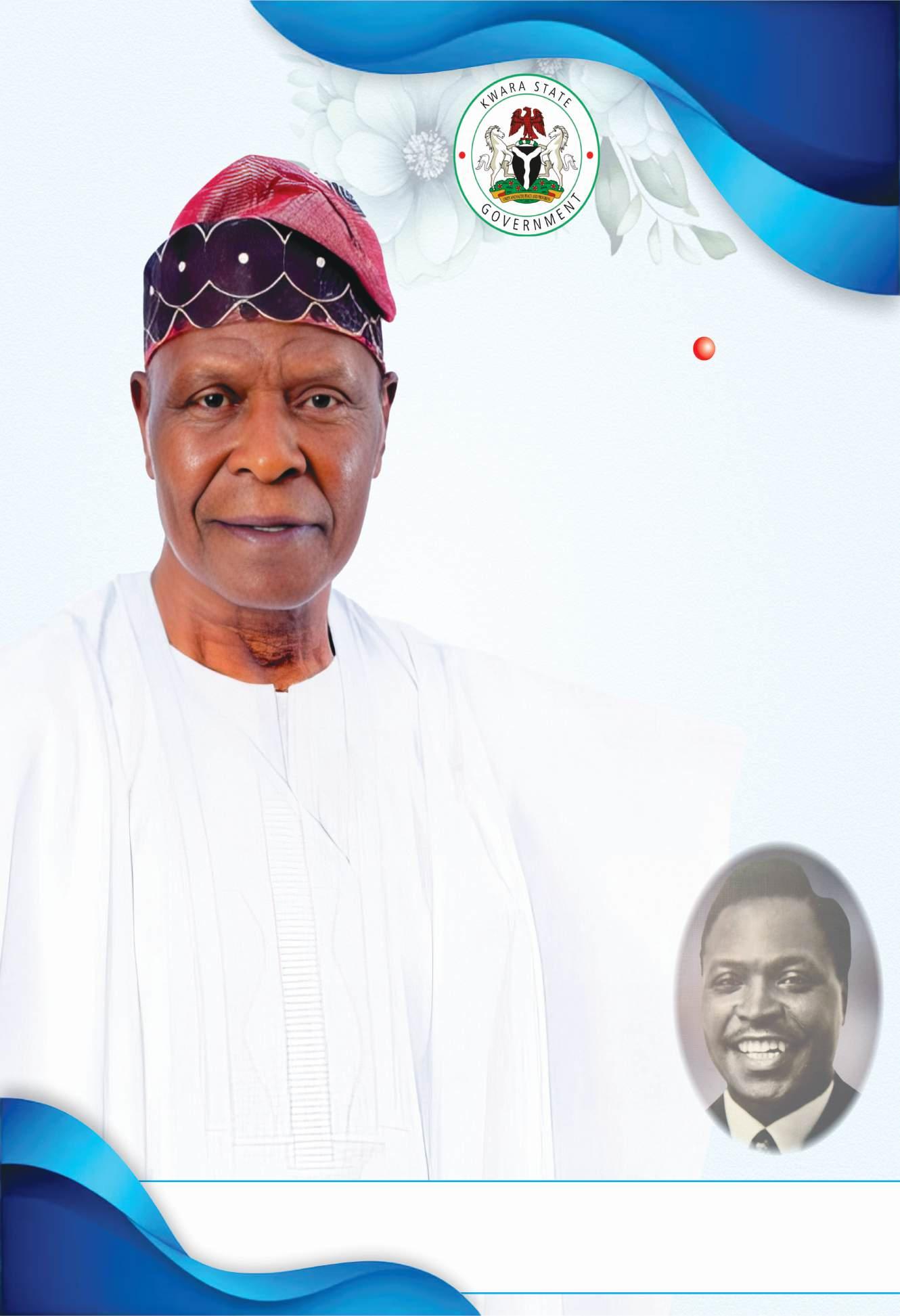
Governor AbdulRahman AbdulRazaq and the People of Kwara State
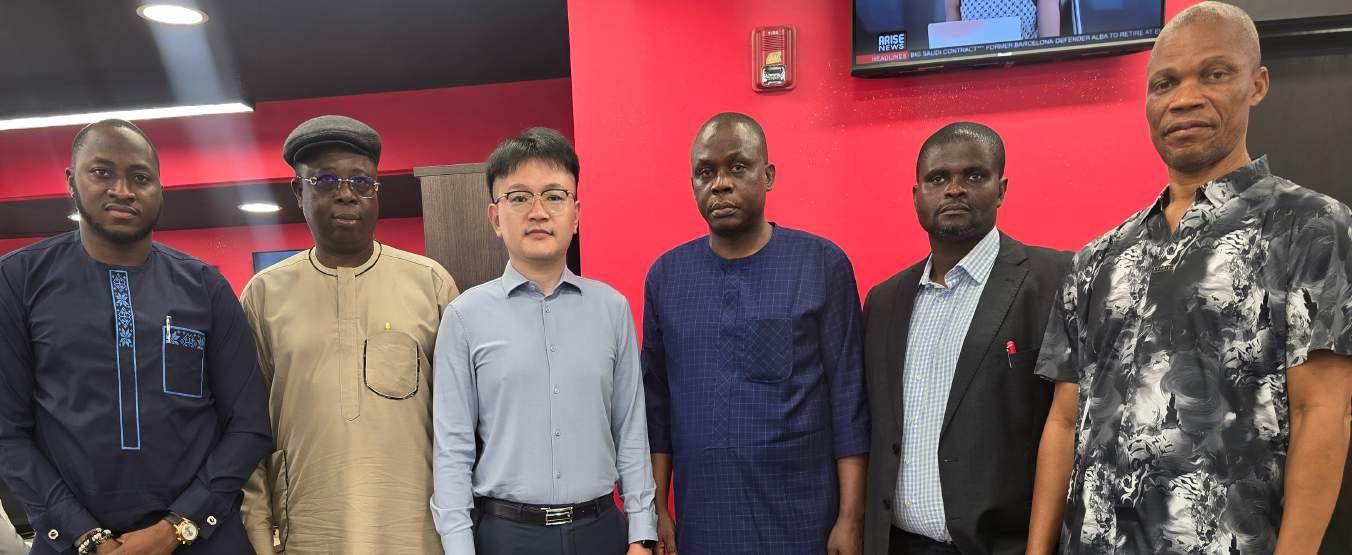
Oluchi Chibuzor
The Chief Executive Officer, Premier Lotto Limited, Chief Kessington Adebutu and Chairman of Channels Media Group, Dr. John Momoh, have called on the government to urgently intervene on secondary school infrastructure across the country as the sector is currently facing a crisis of quality and purpose with the number of out-of-school ages becoming alarming.
The Baptist Academy Old Student Association (BAOSA) also launched a N1 billion infrastructure renewal drive. They maintained that the
future of Nigerian schools will not be shaped on the hand of the government alone but in the hands of those who believe in raising future leaders, insisting that groups, individuals and alumni associations must become conscious of the activities of the Ministry of Education.
Adebutu and Momoh made the call at the 170th Founders’ Day Public Lecture of the Baptist Academy with the theme, ‘Bridging The Gap: Restoring Trust Between Schools, Government and Society’.
According to Adebutu, the country must begin to
I, formerly known and addressed as JANE OGECHI ISIBOR and/ or ISIBOR OGECHI JANE now wish to be known and addressed as JANE OGECHI MOMAH (MISS.) All former documents remain valid, public and private institutions take note.
I formerly known and addressed as MISS ODILNO OGECHI PATRICIA, now wish to be known and addressed as MRS ODUKWE OGECHI PATRICIA All former documents remain valid. The general public take note.
I formerly known and addressed as IBOM EMEKA CHINASA, now wish to be known and addressed as IBOM CHUKWUEMEKA MICHAEL All former documents remain valid. The general public take note.
I formerly known and addressed as SHETTIMA KALSUM MOHD, now wish to be known and addressed as SHETTIMA AMINA KABIRU UBALE All former documents remain valid. The general public take note.
I formerly known and addressed as OGHENEROROH KINGSLEY EMAJORO, now wish to be known and addressed as EMAJORO KINGSLEY OGHENERORO All former documents remain valid. The general public should please take note.
I formerly known and addressed as KUNLE GBADEYAN, now wish to be known and addressed as OLAKUNLE SHERIF GBADEYAN All former documents remain valid. The general public should please take note.
CONFIRMATION OF NAME
This is to confirm that I, UTOR MERCY M. and UTOR MERCY MNGOHOL refer to one and the same person. Henceforth I want to be bearing UTOR MERCY MNGOHOL. All former documents remain valid. General
I formerly known as OGBUEHI OKAFOR KENNETH and OGBUEHI OKAFOR KENETH, is the same person with the Date of Births 22/07/1970 and 01/01/1940 and now wish to be known and addressed as OKONKWO KENNETH OKAFOR, Date of Birth 12/07/1970 All former documents remain valid. The general public should please take note. This is to notify the general public that my name was wrongly written during my Premium Pension registration as LATEEF MOHAMMED with WRONG DATE OF BIRTH of 30/1/1970 instead of 31/1/1970. Henceforth, I wish to be known and address as LATIFU MOHAMMED and my DATE OF BIRTH us 31/1/1970 All documents remain valid. All relevant authorities should take note.
empower youths with the right tools to prepare for jobs of the future.
“I encourage the Alumni to ensure that it provides the youths with the right tools
to be able to prepare for the jobs of the future. As part of my commitment I am donating N50 million to the infrastructure development funds to my alma mater.
From artificial intelligence, to climate innovation and technology, let us prepare them for the future that lies ahead,” Adebutu said.
In his keynote lecture,
Momoh said that the story of secondary education in Nigeria remains a mirror of the national condition — full of promise, yet troubled by persistent challenges.
Nnaji Calls for AI Integration in Schools, Akande attributes decline in nation’s education system to military takeover
President Bola Ahmed Tinubu has reaffirmed his administration’s commitment to making education the heartbeat of Nigeria’s democracy, the cornerstone of its economy, and the soul of its future.
Also, Chairman and Chief Executive Officer of Geometric Power Group and former Minister of Power, Prof. Bart Nnaji, has called on the federal, state, and local governments to jointly fund the provision of computers for every publicschool teacher in Nigeria as part of efforts to integrate Artificial Intelligence (AI) into the education system.
This was as former Osun State Governor and elder statesman, Chief Bisi Akande, has attributed the decline in Nigeria’s education system to the military takeover of regional schools in 1976.
They disclosed this yesterday at the Independent Newspapers public lecture to commemorate 70 years of Free Universal Primary Education (UPE) in Nigeria.
President, who was represented by the Executive Secretary of the Universal Basic Education Commission (UBEC), Dr. Aisha Garba, said
that every Nigerian child must have access to quality learning as a national duty.
He said his government is reviving the covenant made in 1955 when the late Chief Obafemi Awolowo launched the free education programme in the Western region.
Prominent Niger Delta leaders, including Bayelsa State Governor, Douye Diri and former Delta State Governor, James Ibori, have hailed the late Chief Diepreye Alamieyeseigha as a timeless symbol of justice, true federalism, and the struggle for resource control.
They said Chief Alamieyeseigha, who was the first civilian governor of Bayelsa State, represented the voice of the Niger Delta people
The Delta State Executive Council has approved a total of N10 billion for disbursement as the state government commenced the process to offset the pension liabilities inherited from previous administrations in the state.
The EXCO meeting on Thursday, presided over by Delta Deputy Governor,
Under the Renewed Hope Agenda, he explained, education is now placed at the foundation of national rebirth, with reforms to improve access, quality, accountability, and coordination across the sector.
and that his legacies would continually inspire generations in the quest for justice, fairness and development.
They spoke yesterday, at the 10th memorial anniversary in honour of Alamieyeseigha in Yenagoa, Bayelsa State.
Speaking at the event, which had as its theme: "The Niger Delta Voice Through Nigeria's Soul: Federalism, Resource Control and The Contemporary Nigerian
Sir Monday Onyeme, who stood in for Governor Sheriff Oborevwori who was on official engagements outside the state, also deliberated on several important memos cutting across social investment, infrastructure, and governance reforms, the state Commissioner for Works (Rural Roads) and Public Information, Mr. Charles Aniagwu, told journalists at the Government House Asaba.
“It is not a slogan, but the organising principle of this administration, to make education once again the engine of national renewal, the guarantor of equal citizenship, and the path to shared prosperity,” the President said.
State in The DSP Alamieyeseigha Legacies,” Diri said for Nigeria to make progress, it should practice a federal system of government where the sub-national units enjoy relative autonomy guaranteed by its Constitution.
He described as an aberration the situation where Nigeria, which ought to be operating federalism, controlled the resources of the subnationals thereby shortchanging them of their God-given wealth.
Flanked by the Commissioner for Economic Planning, Mr Sonny Ekedayen; and that of Housing, Mr. Godknows Angele and the Chief Press Secretary to the Governor, Sir Festus Ahon, Aniagwu said the N10 billion disbursement approval was in fulfilment of "Governor Oborevwori’s promise to ease the hardship of pensioners and to defray inherited pension liabilities."
Lagos hosting of Africa’s first E1 electric powerboat championship has positioned the State as a competitive destination for global tourism and sports investment, writes Charles Ajunwa
After recording a huge success in last year’s Detty December, which showcased Lagos as one of the thriving tourism destinations in the world, the state again last Friday made history as it became the first in Africa to host the E1 electric powerboat championship. Lagos joined Monaco, London, Jeddah, and Venice on the global stage.
Lagos Boat Club in Ikoyi, venue of the E1 electric powerboat race, welcomed sports enthusiasts from all walks of life who, upon their arrival, went through security checks before finally being allowed into the serene and beautiful coastline. Organisers announced that over 300 foreigners from different countries arrived Lagos to participate in the powerboat racing sports.
Lagos State Governor, Babajide Sanwo-Olu, who led state officials in a boat regatta at the colourful opening ceremony, said the competition was not only about sports but also a platform to showcase Lagos’ capacity for global events and sustainability.
“For us in Lagos, the E1 Lagos GP, the first to be held in Africa, is a befitting accolade to a sports-loving people and a government that knows the place of sports in human development,” he said.
President Bola Tinubu, who threw Nigeria’s weight behind clean energy and marine innovation, commended Sanwo-Olu and the sponsors for bringing the championship to Nigeria.
“This championship is not merely a thrilling spectacle on water but a statement of intent. The E1 Powerboat series combines world-class entertainment with clean energy innovation, showcasing electric-power vessels that point the way to a greener and more sustainable future,” Tinubu said.
He linked the E1’s powerboat championship as part of his administration’s vision for the blue economy, noting that his administration is committed to building prosperity around renewable energy, marine tourism, and coastal infrastructure.
“By investing in our coastal infrastructure, marine tourism, and renewable energy, we create jobs, open new opportunities for youth, and strengthen Nigeria’s place in the global community,” he added.
The President, who described himself as a “proud Lagosian,” said ”Lagos, the cultural capital of Nigeria, the heartbeat of our economy, and a symbol of our resilience, is the perfect host. Its vibrant waterways and dynamic people embody the spirit of competition, creativity and hospitality.
“I commend Governor Babajide Olusola Sanwo-Olu, his team, and all partners, particularly the E1 and sponsors of this event, for the vision and hard work that made this possible.”
Team Brazil won the championship, seizing the maiden race in Africa to claim their first win in the all-electric powerboat series. Team Brazil duly capitalised from the group races to the final, with Timmy Hansen delivering a flawless performance on the water. They had the fastest time in the practice session and topped the qualifying race on Saturday before winning the final on Sunday.
They beat Team Blue Rising, owned by Indian cricket icon Virat Kohli, to second place while Team Drogba Global Africa, which is co-owned by Ivory Coast football legend and former Chelsea striker Didier Drogba and Gabrielle Lemaire, finished third. Team Brazil got 38 points for their win, taking their tally

up to 89 points.
“We came to Lagos and we had a fantastic time. It is important with the race format to have the best starting lane, so you want to start on the inside, and we had it. Thanks to the team, I had a brilliant start, and it was smooth sailing,” Hansen said.
The E1 is an all-electric powerboat race which began last year in Jeddah, Saudi Arabia, and Lagos became the first city in Africa to host the championship.
The E1 Lagos was also the penultimate race of the season, setting the tone for the championship battle ahead of the season finale in Miami next month.
Speaking to journalists during the championship, Sanwo-Olu, described the first-of-its-kind event in Africa as a demonstration of the state’s commitment to innovation and clean energy.
“Hosting the E1 series is not just about sports, it is about innovation, environmental responsibility, and putting Lagos on the global map for future-focused development,” Sanwo-Olu said.
Apart from supporting coastal conservation and marine research, the E1’s RaceBird boats use zero-emission electric propulsion and foil technology to reduce environmental impact.
The Chief Executive Officer, Rodi Basso, who revealed that Nigeria is the first country in Africa, fourth continent E1 electric powerboat games has so far touched, said Lagos was chosen for its “energy, drive for change, and alignment with E1’s values of sustainability, tourism and technology.”
He said E1 plans to expand to 12 teams from nine and increase the number of races to 15 from seven. The championship, according to him, is seeking 20 million euros ($23.48 million) of fresh capital and is targeting a valuation of 500 million euros
The Ananse Centre for Design Lagos, a state-of-the-art creative hub dedicated to empowering Nigeria’s fashion and design sector, has officially launched in Lekki, Lagos.
The initiative spearheaded by Ananse in partnership with the Mastercard Foundation and supported by Nigeria’s Federal Ministry of Art, Culture, Tourism and Creative Economy, aims to equip thousands of young creatives with the skills, tools, and market access needed to build thriving businesses and sustainable careers.
The 1,200-square-meter facility will also serve as a training and innovation hub for emerging fashion entrepreneurs, just as it forms part of Ananse’s wider goal to support over 5,000 design-focused creatives and create access to 50,000 jobs, with 70 per cent of participants being young women.
Speaking at the official launch event, Founder and Chief Executive Officer of Ananse, Samuel Mensah, noted that participants of the training programme will benefit from 22 courses across five modules: Business Skills, Business Development, E-commerce, Marketing, and Product Development, delivered both physically at the Centre’s fashion hub and virtually through interactive live sessions.
According to him, “The Ananse Centre for Design Lagos is more than a space, it is a catalyst for change. By combining training, infrastructure and global market access, we are giving thousands of young creatives, especially women, the chance to turn their talent into sustainable livelihoods.
“This launch marks an important step in building a future where
African design thrives locally and globally. The Centre will also feature training rooms for mentorship and masterclasses, content studios to amplify brands, photography and Computer-Aided Design labs for product development, and specialised studios for leather, clothing, shoes, and bags.
“A private showroom will provide space to showcase designs, while co-working spaces will foster collaboration and peer learning. Though anchored in Lagos, the centre will welcome participants from across the continent and has made affordability and accessibility central to its model, ensuring that vulnerable groups, including displaced people, can participate and benefit.”
In her remarks, Country Director, Nigeria Program, Mastercard Foundation, Rosy Fynn noted that, “Our partnership with Ananse and the unveiling of the Centre for Design Lagos reflects the Mastercard Foundation’s strategic commitment to the creative sector as a catalyst for youth opportunity.
“By bringing together training, infrastructure, and access to markets, the Centre creates pathways for young people, especially young women, to thrive, build sustainable livelihoods, and contribute meaningfully to inclusive economic growth.”
It is worthy of note that the Federal Ministry of Art, Culture, Tourism and Creative Economy of Nigeria has also endorsed the Centre and signed a five-year memorandum of understanding with Ananse to scale the model nationwide.
According to the Minister, Hannatu Musa Musawa, “The launch of the Ananse Centre for Design Lagos aligns with our commitment to advancing Nigeria’s creative economy.
“By investing in skills, facilities and global visibility for our designers, we are creating jobs, supporting women and youth, and ensuring Nigerian creativity is recognised on the world stage.
by 2030, noting that talks with investors, including several highnet-worth individuals, are ongoing.
“We’re not in a rush. But we have a compelling plan to accelerate over the next three to four seasons,” he said.
Celebrity owners also including basketball great LeBron James and Ivorian former soccer player Didier Drogba are helping drive global visibility. “Their reach is compelling,” Basso said, adding “It’s an insurance for growth.”
However, commenting on the feat achieved by Lagos, tourism expert and founder of Akwaaba African Travel Market, Mr. Ikechi Uko, recommended global strategies that should be planned, implemented and executed for Lagos or Nigeria to get the benefits of hosting such big international events.
He said, “Though E1 is not as popular as the other boat races but it’s still a fantastic product to host. Hosting of major events like this puts you on a global calendar. People who follow that sport have other reasons to come to your destination.
“You know they came from Doha to Lagos and they are going to Miami and when I watch some of those races in Florida, in Fort Lauderdale and places like that, there are massive followers and those are the kind of niche sports that we can use to grow our destination.
“We might not be able to get the mass market products, the F1s and the rest of them. Those ones are already highly marketed but we can start with some and at least I saw some nice visibility and publications on it.
“That’s a way to start and hosting such events well planned won’t fail, but in Nigeria we normally host things in a staccato fashion. We don’t plan long-term so we do not get those benefits. Lagos has done well with this. I think they will plan better with other events of such global magnitude.”
Uko added, “Events like MICE is one of the most powerful weapons in developing a city into a real international product. Kigali is number two on the MICE ranking in Africa. And it can host even basketball and every other major conference now. It brings people who normally would not want to come to your place to your place.
“So if Lagos wants to use that tactics, there is a strategy that has to be developed. Like I said, it’s not staccato. You just don’t get up just to host an event for the sake of hosting event. Nigeria has hosted things like that in the past. It didn’t give us the benefits. There is a real strategy that has to be planned, implemented and well executed to get the benefits of it. If that is how Nigeria or Lagos wants to go, then they have to develop a real global strategy. And there are learnt lessons from Monaco, from Macau, from Singapore, Abu Dhabi. There are templates that could be used and implemented if this is how we want to go about it. And I recommend it’s something we should look into.”
Before the commencement of the electric powerboat championship, Lagos State Commissioner for Information, Gbenga Omotosho, announced that the competition is about innovation, creativity and the spirit of Lagos.
He said, “The sports is all about Lagos joining the rest of the world as a model mega city where businesses can thrive, where innovation can thrive.
“This sport is the kind of thing that we have never seen here before. So, for us in Lagos, we are joining the conversation about sustainability, about clean energy, about low emission so that the world can know that all of the things we are saying about climate change, that Lagos is also part of the conversation.
“For us, it’s much more than a race. It’s about our culture, It’s all about our economy. It’s all about Lagos, it is about GDP, this is going to boost the economy. Already, some of the hotels around the venue are fully booked.”
As the world marks the International Day of the Girl Child, the Director General of Lagos Chamber of Commerce and Industry, Dr. Chinyere Almona, says the foundation of the confidence and ambition she built was laid early in her life by her parents who believed education had no gender and encouraged their daughters to dream as boldly as their sons. That conviction guided her rise to the top of Nigeria’s business community and shaped her advocacy for women’s empowerment and inclusion. Yet, beyond her professional success, Almona remains re- freshingly honest about life’s balance, insisting that the superwoman exists only in comics, not in real life. In this conversation with Dike Onwuamaeze, she speaks about leadership, family, mentorship, and why empowering the girl-child today is crucial for building a fairer, stronger, and more prosperous Nigeria
As we mark the International Day of the girl-child today, what does this year’s theme mean to you personally and professionally?
The theme for this year is “The Girl I am, the Change I Need, and Girls on the Front Lines of Crises.” That theme resonates with me as a female and as a leader. It does portray the fact that the future is not something we wait for but something that we have to intentionally create. And personally, it reinforces my lifelong ambition or passion to mentor young women, encourage them, and challenge them to be who they are meant to be. At a professional angle as well, it challenges me as the head of the chamber to ensure that we have policies that will encourage female participation in the workplace and also create the right environment for girls to take leadership positions.
You have built an impressive career in leadership and policy. What early experiences shaped your confidence and ambition as a young girl?
My parents were educators. My mum and dad were lecturers and they did not believe that education was gendered. So, both males and females were treated the same way when it came to building our skills, confidence and dreams. That, for me, was the backbone of who I am today. They encouraged me to ask questions. They did not stop me from aspiring for big things because you are a woman. For me that was my childhood and upbringing that helped me build my confidence as a leader.
Many girls in Nigeria face barriers to quality education. What specific interventions do you think can make the
biggest difference in bridging this gap?
I can think of three quick things. One is access to finance. If you want girls to go to school you have to remove the financial barriers. That will mean that some of these schemes like education loan should be implemented more broadly so that we can have real tangible results and it should also be inclusive. Sometimes when a household is faced with little finance it begins to prioritise who should go to school and who should not go. I also think that we need to make the school environment conducive for women. It should be free from gender based violence. The environment should be safe. We should also have female friendly sanitation facilities. Thirdly, we need to think how to integrate digital education and vocational skills early enough at primary and secondary school levels so that people can grow with it. That is developing girls not just for work place but giving them live skills.
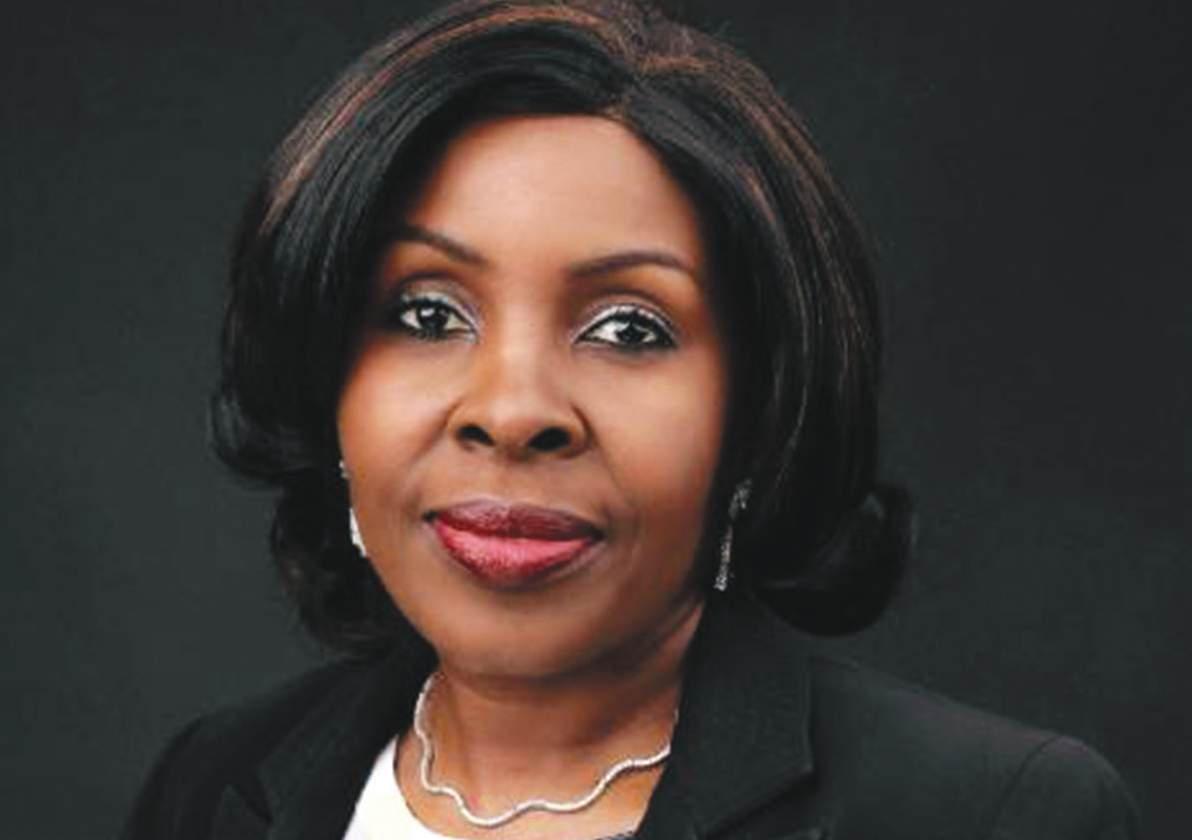
The girl child you are building today, who may be 10 years should be 30 years in the next two decades and should be contributing significantly to the economy. If you do not build her today, you will lose her contributions in the future
How can institutions like the LCCI play a role in empowering the girl-child beyond corporate social responsibility?
Corporate social responsibility is a viable way to do it. But beyond Crs such development needs to be more systemic and that is where we come in as LCCI because we advocate for inclusive economic policies and we also drive mentorships through different things that we do. We also have essay competitions that over the years have seen girls emerge from that space. so, initiatives that we do are pretty much trying to make it more systemic to encourage girls and create more opportunities for them.
What advice would you give to young girls aspiring to leadership in business, public service, or entrepreneurship in today’s Nigeria?
dream big! dream! dream! dream! and do not stop dreaming. secondly, is that they should not be afraid of who they are. a lot of girls have the skills and power to do so much but they are curtailed by culture and even religion. and I will like to say to girls: build your skills because you have to present something to the world. Let their passions drive skill development. they should not feel that they are entitled to be helped because they are girls. they need to understand that they have to add value wherever they are. Leadership is a responsibility and not a title and girls must understand that early enough.
Women contribute significantly to Nigeria’s informal economy, yet many lack access to finance. What practical steps can be taken to close this gender financing gap?
Over the years I have found out, as I have worked in different institutions like the pwC and the World Bank and so I understand the importance of bridging this gap. I have also as the director general of LCCI have continued to work with development institutions to see how we can remove the gender limitation in financing. We need to get our financial institutions to understand that lending to women is different to lending to men. In some communities women do not have
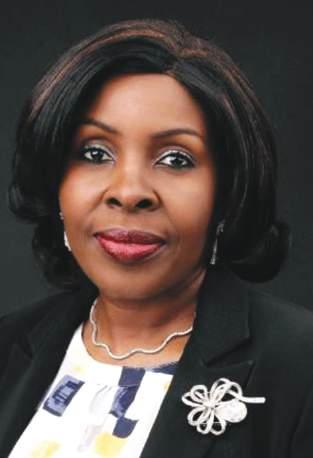
access to land. an institution that lends based on land as collateral probably does not want to lend to women. so, we need to figure out how to lend to women. there are so many dynamic ways to lend to women like using cash flow to lend. Institutions have to be intentional on how to lend to women. Institutions have to embrace doing more for women.
In your view, how does empowering the girl-child today influence Nigeria’s economic trajectory over the next two decades?
they say that if you do not start, you will never start. so, this is the time when we should be putting the building blocks in space for what we want to see in the next two decades. the girl child you are
building today, who may be 10 years should be 30 years in the next two decades and should be contributing significantly to the economy. If you do not build her today, you will lose her contributions in the future. the reality is that if we can empower the girl child to know what she is worth and what he can deliver and give her the right skills and the right tools, then you are preparing for a buoyant economy in the future.
What role do you think financial literacy and entrepreneurship play in helping young women escape the cycle of poverty and dependency?
Financial literacy basically is to give one the skills or the understanding of finance and how to manage money so that you can make informed decisions around money. entrepreneurship on the other hand, helps you to translate your skills and ideas into wealth. some people can make money but do not know how to manage it.
As head of LCCI, what initiatives is the Chamber driving to support female entrepreneurs and promote inclusion in business leadership?
In the chamber, we have the women’s group. the idea is that we want to spotlight women in business and give them a voice for advocacy and capacity building. two years ago, we had seminars and conferences to encourage women. there is one we did on how to stop the marriage of the girl child. It is important for us as an organisation to continue to contribute to these conversations because the more you speak about them the more these issues come to the fore and can be dealt with. But nobody pays attention to them when you shy away from speaking about them. so the women group here is vibrant. and beyond the women group, other sectors work hard to ensure that there is proper inclusion that women are considered in the leadership of the excutives of the different sectorial groups that operate within the chamber.
You’ve achieved remarkable success in a demanding field. How do you personally balance
leadership, family, and self-care?
as a woman, I have realised that the superwoman is only in the comics or in Nollywood but not in real life. so, women have to understand where their limitations are, where they need to leverage their community, family, and rely on other people to do certain things. you need to be clear about what you need to do and what you need to achieve, and how you get there. But remember that you have to have a framework and support system. and that support system is not just those who are supporting you but you should also support others in different phases. It should be give and take because that is how a support system works. For me, being able to manage my work life and every other thing is to keep a vibrant support system.
Many working mothers struggle with burnout. What lessons have you learnt about maintaining emotional balance?
the lesson is that you cannot pour from an empty cup. you have to first take care of yourself, including your mental well-being, before taking care of others. If you do not take care of yourself, you will not be able to take care of others. Once you understand that you prioritise your own self-care because that is what is required to be a leverage point for you to effectively take care of your family.
Finally, what would you say to a 10-year-old Nigerian girl today who dreams of breaking barriers but feels unseen or unheard?
I will say to her: young girl, keep dreaming. you are seen. you just feel unseen, but people are seeing you. Keep doing what you are doing and keep speaking. do not stop. do not let people dampen your dream. do not let people cover you up. speak for yourself and the passion you are carrying. you are unique in yourself, and what you have no person has it. so, you must be able to give the gift of yourself to the world. Keep dreaming. Be ambitious. expand and build skills. start from where you are and build up.
as economies increasingly recognise human capital as the cornerstone of development, experts argue that Nigeria’s progress depends on how effectively it manages and maximises its workforce, writes Sunday Ehigiator
When Nigeria’s economy is discussed, the conversation often revolves around oil, infrastructure, and capital investment. Yet, beneath these dominant narratives lies a quieter but more powerful growth engine, human resources.
experts say that without a strategic focus on human capital development and effective Hr management, the nation’s dream of sustainable economic prosperity will remain elusive.
“Human resources is the real economy,” Human capital Strategist, Della Ade-Aduke Adegbenro said.
She added: “It’s not just about people management within organisations; it’s about shaping the productivity, innovation, and competitiveness of the entire nation.”
The Missing Link in Nigeria’s Economic Equation
Nigeria, Africa’s largest economy by GDP, continues to grapple with sluggish productivity, high unemployment, and a mismatch between education and job market needs.
Despite significant investments in infrastructure and technology, the country’s Human Development Index (HDI) remains among the lowest in emerging economies.
According to the World bank (2024), Nigeria’s human capital index is just 0.36, meaning a child born in the country today will be only 36 per cent as productive as they could be with full access to quality education and healthcare.
this gap, analysts argue, reflects a deeper problem: the undervaluation of human resources as a strategic growth driver. While financial and physical capital attract policy attention, Hr, which determines how effectively human talent is mobilised and optimised, is often confined to administrative functions.
“We have treated Hr as a support department
rather than a policy instrument, but in a modern economy, human resources management is an essential lever for national competitiveness,”
Adegbenro explained.
How HR Shapes Growth
At the organisational level, Hr practices directly influence productivity and profitability. Global data from the World economic Forum (2023) show that firms with structured employee development programs record 21 per cent higher profitability and 17 per cent greater productivity. In Nigeria’s private sector, companies that prioritise workforce planning and continuous learning have demonstrated stronger resilience amid economic instability.
take the financial services industry, for instance. Institutions such as Access bank and GtcO have invested heavily in employee training, leadership development, and performance analytics; strategies that have positioned them for global expansion and sustained profitability. these successes, Adegbenro noted, highlight how Hr can serve as an “economic multiplier” when embedded strategically within business models.
According to her, “the microeconomic impact of Hr translates into macroeconomic outcomes. every time an organisation improves its talent management, enhances skills, or builds employee engagement, it contributes directly to national productivity and GDP growth.”
Human Capital as National Strategy
According to Adegbenro, “Globally, countries that have prioritised human capital, such as Singapore, South Korea, and the United Arab emirates, have used Hr-centric policies to accelerate development.
“their approach links education, skills development, and workforce strategy into one continuous pipeline. In contrast, Nigeria’s workforce development remains fragmented between ministries, agencies, and private institutions, with little synergy between education outputs

and labour market needs.
“the Organisation for economic co-operation and Development (OecD, 2022) found that a 10 per cent increase in national skills proficiency could raise a country’s GDP by 2 per cent over time. For Nigeria, this could translate into billions of dollars in additional output annually.
“Imagine if every Nigerian worker were 10 per cent more productive; the impact on GDP, innovation, and global competitiveness would be transformative.
“Yet, the country’s education-to-employment transition remains weak. While over 1.5 million graduates enter the labour market each year, many lack the digital, managerial, or problem-solving skills needed in modern industries. As a result, underemployment, not just unemployment, has become a defining feature of Nigeria’s economy.”
HR at the Policy Table: A Strategic Imperative Adegbenro argued that Nigeria’s economic
reforms must move beyond fiscal and monetary policies to include human resource strategy as a pillar of development planning. She believes Hr professionals should be integral to policy formulation at both public and private levels.
“economic diversification is impossible without human resource diversification. If we want to grow beyond oil, we must develop and manage talent across agriculture, manufacturing, technology, and services with the same rigour that we apply to capital allocation.
“this requires a shift from reactive to strategic Hr leadership, one that anticipates workforce trends, designs future-ready skills frameworks, and aligns human capital with industrial policy. We need Hr ministries or national human capital councils that drive talent strategy at scale.
“countries like Singapore and rwanda have already adopted such models, integrating human resource development into national economic planning. Singapore’s SkillsFuture initiative, for instance, offers citizens continuous reskilling opportunities linked to industry demands; an approach Nigeria could emulate through partnerships between the National Universities commission (NUc), Industrial training Fund (ItF), and the Nigeria employers’ consultative Association (NecA).”
Digital Transformation and the Future of Work Adegbenro posited that the rapid adoption of artificial intelligence (AI), automation, and remote work has redefined the nature of employment globally.
“In Nigeria, digital industries, including fintech, health tech, and creative technology, have emerged as growth frontiers. but they also expose gaps in workforce readiness.”
According to a McKinsey & company (2022) report, up to 30 per cent of current jobs in emerging markets could be automated by 2030. this presents both a threat and an opportunity for Nigeria.
Drums, dance, and the rich aroma of diverse food filled the air as Nigerian culture took centre stage at this year’s Spartanburg International Festival in South Carolina, where thousands recently gathered to celebrate global diversity through food, music, and art. At the heart of the festivities, members of the South Carolina Chapter, United States, of the Nigerians in Diaspora Organisation led a vibrant showcase of the nation’s heritage, writes Sunday Ehigiator
The smell of bottom-pot jollof rice, curry spices, and roasted plantains floated through the crisp October air as thousands of people gathered at Barnet Park for this year’s Spartanburg International Festival.
For decades, the first Saturday in October has turned this South Carolina city into a vibrant crossroads of world cultures; a place where neighbours from every continent meet to share stories, food, dance, and identity.
This year’s festival was especially memorable, drawing thousands of visitors and more than 30 cultural tents from around the globe. Each one offered a different sensory journey; from African drumming to South American dance, from Asian calligraphy to Mediterranean flavours.
Yet, among all the countries represented, it was Nigeria, with its bold colours, rhythmic beats, and signature cuisine, that drew some of the festival’s biggest crowds.
Celebrating unity through diversity
The International Festival began with the traditional Parade of Nations, a dazzling display of flags, costumes, and music. Families lined the pathways, cheering as representatives from more than 30 nations proudly waved their flags. The sight captured the essence of the event: unity in diversity and the shared humanity that binds people across borders.
According to a Special Events Director for the City of Spartanburg Parks and Recreation, Kim Brown, “It just feels so encouraging to come together with so many people from across the world and experience their cultures in one space.”
For first-time visitors, the festival offered an education in global coexistence. For longtime residents, it reaffirmed Spartanburg’s growing identity as a multicultural hub; a city whose global spirit mirrors its industrial diversity, with ties to more than 100 international companies.
Nigeria Shines at the Cultural Avenue
Under a bright green-and-white canopy, the Nigerian booth stood as one of the liveliest corners of the festival. The aroma of spicy jollof rice, fried plantains, and puff-puff (a sweet dough delicacy) drew long queues of curious visitors.
Volunteers dressed in vibrant Ankara outfits danced to Afrobeat rhythms while explaining the meaning behind their attire; patterns that often tell stories of family, status, and heritage.
“This is more than a food stand; it’s our culture on display,” said Dr Helen Abasute, President of the Nigerians in Diaspora Organisation (NIDO) Americas, who joined other volunteers at the Nigerian booth.
“Through festivals like this, we show that Nigeria is not only about oil and business. It’s about resilience, creativity, and community.”
Also, the President, NIDO, South Carolina Chapter (NIDOSC), Dr. Emmanuel Igwe, said the ceremony was a remarkable success.
According to Igwe, “this year, Nigeria stood out as a beacon of pride, with our NIDOSC members leading the way.”
He added: “Our presence included a dynamic mix of medical professionals, engineers, nurses, psychologists, clergy, students, and business leaders deeply invested in the fabric of South Carolina. Our traditional offerings—jollof rice, suya, fried chicken, Puff-Puff, chin-chin, and Zobo drink—were a festival highlight.
“We couldn’t keep up with the enthusiastic crowd flocking to savor our delicious dishes, demonstrating a high demand for the flavors of Nigeria. The energy at the Nigerian tent was infectious, as guests danced to Afrobeats and learned about our vibrant heritage through engaging conversations and colorful displays.
“All our members with a swag danced to Nigerian music, drawing applause and sparking curiosity among attendees eager to learn more about Nigeria’s
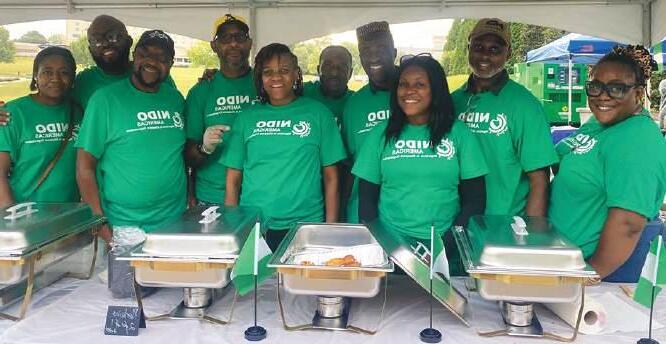
r-L: Dr. Nnenna
Dr. ND Chuku and Mrs. Jane Hassan, at the Spartanburg International Festival in South Carolina, united States…recently
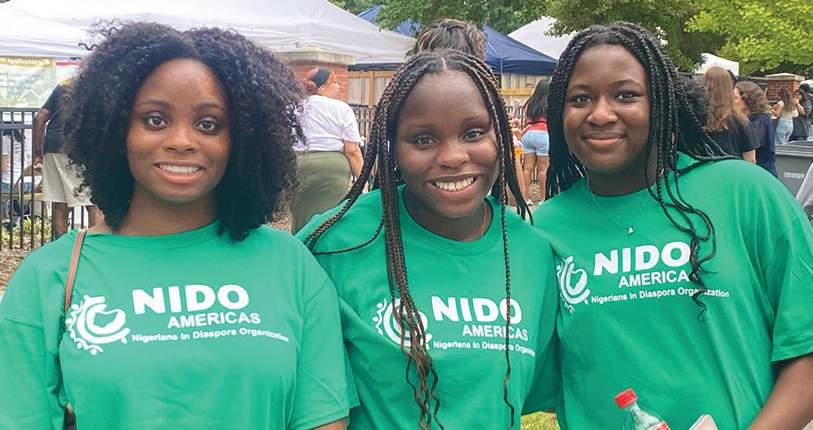
traditions. This genuine sense of community and pride was evident in every interaction, making the festival not just a celebration of culture but a testament to the bonds we continue to build across continents.
“Building on the momentum from this year’s festival, our chapter remains committed to deepening our impact both locally and globally. With each event, we strengthen our connections and amplify the voices of Nigerians making meaningful contributions in South Carolina and beyond.
“As we continue to foster cultural exchange and unity, we encourage everyone to remain engaged, share their talents, and uphold the values that make our community vibrant. Looking forward, our focus will be on expanding outreach, empowering the next generation, and celebrating the achievements of Nigerians everywhere.”
Igwe stressed the need to “keep the spirit alive and ensure that Nigeria’s legacy shines brightly for years to come.”
“We are incredibly grateful to our host city and state for their recognition and support. As we look ahead to next year’s festival, we invite all Nigerians to join us in celebrating our heritage and culture, uniting to showcase the essence of who we are. Together, let’s continue to inspire and connect with our communities all over the globe! Nigerians, no matter where they are, are always ready to be their best. We Move,” he added.
Visitors sampled dishes while learning about Nigeria’s ethnic diversity, from the Yoruba to the Igbo and Hausa, and discovered the country’s role as Africa’s most populous nation. Children were invited to join mini-dance lessons, while adults practised a few Yoruba greetings; laughter
and music filled the air.
Connecting diaspora and homeland
Behind the lively booth and cultural displays was a deeper mission. NIDO serves as the official umbrella for Nigerians living abroad.
Established in 2000 and recognised by the Government of Nigeria, NIDO operates through continental arms, including NIDO Europe, NIDO Americas, and NIDO Africa, to mobilise professional and economic resources to support national development.
From London to Atlanta, the organisation provides a platform for Nigerians to connect, collaborate, and give back. Its members include doctors, engineers, educators, entrepreneurs, and artists; all committed to leveraging their skills for Nigeria’s progress.
The Festival’s Human Connection
At its heart, the Spartanburg International Festival was not just about performance; it was about people. As attendees moved from tent to tent, they encountered stories that humanised global migration and multicultural living.
“I love learning about different cultures. It’s amazing how much you can discover in one day,” said Cliff Dewberry, a resident who has attended the festival for over a decade.
“Every time I come, I leave with a new appreciation for someone’s story.”
Festivalgoers interacted with Hmong families from Southeast Asia, Haitian drummers, Korean tea masters, and Paraguayan dancers; Paraguay being this year’s “honoured country.” Each encounter revealed how cultural heritage continues to thrive
even thousands of miles away from home.
For many, it was emotional. “Not many people know about Hmong people. We descended from China,” said Paxton, one of the participants. “Seeing our community represented here really touched my heart.”
A taste of the world
One of the festival’s biggest attractions remains the Boulevard of Food, a colourful stretch where global cuisines take centre stage. Lines stretched across the park as visitors traded their festival tokens for dishes from Asia, Africa, Europe, and Latin America.
The Nigerian stall was particularly busy. The rich orange hue of jollof rice shimmered in the afternoon light, served alongside grilled chicken and fried plantains. For dessert, puff-puff and chin-chin offered sweet finishes to a cultural feast.
“The food is always the first thing that gets people’s attention,” laughed Samuel, a Haitian volunteer.
“But when they come for the food, they end up learning something about who we are. That’s what makes this festival special.”
Nearby, stalls from India served samosas and butter chicken, while those from Mexico offered tacos and tamales. The diversity of flavours mirrored the diversity of faces; families of all races and generations sharing benches and stories over meals from faraway lands.
Music, dance, and the pulse of the world
As the day unfolded, Barnet Park came alive with performances that spanned continents. On the main stage, Afrobeat drummers from West Africa performed beside Latin dancers, Celtic pipe players, and Middle Eastern belly dancers. Each act drew cheers from the crowd, proving that rhythm is a universal language.
The festival’s closing performance, a fusion of African drums and South American samba, brought the audience to its feet.
“I’ve been coming here for years, but this year felt different,” said Maria Santos, a festivalgoer from Greenville. “There’s a kind of energy, like the world has come together just to dance.”
Building bridges beyond borders
The Nigerian presence at the festival was also symbolic of something larger: the growing recognition of the diaspora’s role in international community building.
NIDO’s participation in cultural festivals across the United States and Europe is part of a broader strategy to use culture as a tool for diplomacy and development.
With the promotion of Nigerian art, food, and entrepreneurship abroad, NIDO members strengthen networks that can later support investment and collaboration back home.
Many chapters now host ‘Diaspora Days’, ‘Nigeria Investment Forums’, and ‘Return-to-Africa’ mentorship schemes; all designed to bridge the gap between migration and national development.
According to NIDO’s charter, the organisation seeks to: “Promote Nigeria’s image and global trade relations; Leverage the expertise and economic resources of Nigerians abroad; Facilitate information sharing and knowledge transfer between Nigerians overseas and those at home; Encourage patriotic involvement in governance and social investment, and create professional linkages and policy input for sustainable national growth.”
These objectives are already yielding results. Over the years, NIDO members have initiated hospital equipment donations, skills-transfer workshops, and educational programs in collaboration with state governments in Nigeria.
“We believe Nigerians abroad are an essential part of the nation’s future,” said Mrs Uche Okeke, a NIDO Europe representative. “When we showcase our culture here in Spartanburg, we’re not only celebrating identity; we’re strengthening international partnerships.”
Nigeria’s own Mr. Integrity took his last bow on the stage of life in this planet on October 9, 2025. He is Dr. Christopher Kolade, CON, who was born in Erin–Oke, Osun State, on December 28, 1932.
Between the day his entrance was announced and the day he took his final exit from the stage of life, Kolade lived a disciplined, principled, ethical, impactful, and productive life. He was one of the few Nigerians who choose the straight road contrary to the crooked and twisted path.
During his lifetime time Kolade worked as a teacher, broadcaster, a boardroom guru, diplomat and academician. In all these areas of his life’s endavours he left bold exemplary footprints that have influenced some of his countrymen and women to walk and stand on the good life of integrity.
The Chief Executive Officer of Center for the Promotion of Private Enterprises, Dr. Muda Yusuf, summed up the personality of Kolade thus: “He was a great and highly revered member of the corporate world. He was an elder statesman. He consistently propagated the ideals of business ethics and good corporate governance. He was a role model in many enviable respects. He will be greatly missed.”
Kolade came into the limelight as a broadcaster in the 1960s soon after Nigeria’s independence. As the director general of the Nigerian Broadcasting Corporation, Kolade promoted transparency, honesty, championed professionalism and insisted on public-service values.
But it was his position at Cadbury Nigeria that launched him deep into the heartbeat of Nigerian corporate organisations and boardrooms. Kolade was the first Nigerian Managing Director and, later, Chairman of Cadbury Nigeria Plc, where his overriding vision was to “Nigerianise” the operation of the company in a manner that would make it a truly Nigerian company.
His first appointment in Cadbury was the position of director of personnel after he had left his position as the director general of Nigeria Broadcasting Corporation.
Casting his mind back during the 60th anniversary celebration of Cadbury Nigeria in February 2025, Kolade recalled that his vision when he was made the managing director was that this has to become a Nigerian company and we have to work at making it a Nigerian company.
He said: “I came in as director of administration. But four years later I was told that I am going to become the managing director, so I had to develop a managing director’s vision.
“With the decision to make me the managing director, I found myself with what I did not expect.
“My vision then was that if they have ‘Nigerianise’ the chief executive’s position, does that not tell me that I should ‘Nigerianise’ every position because we were having expatriate directors as well then.
“So, my vision was twofold: One, we must try to ‘Nigerianise’ as much as we could because I believed that Cadbury Nigeria should become a Nigerian company rather than an adjunct office of an international business.”
Kolade said he was convinced then that the company was never going to succeed if it continued to depend on expertise from abroad. “So, we have to develop our own expertise,” he said.
He also recalled that he and his colleagues had a rough time pursuing this vision to ‘Nigerianise’ the company.
“The last position to be Nigerianise was that of the technical director because the international group (Cadbury Schweppes) believed that the technical expertise needed for a company like this could not be found in Nigeria and, therefore, has to be someone from abroad.
“But we found a Nigerian with everything you will consider the right qualification to be a technical director. This is in fulfillment of my vision,” he said.
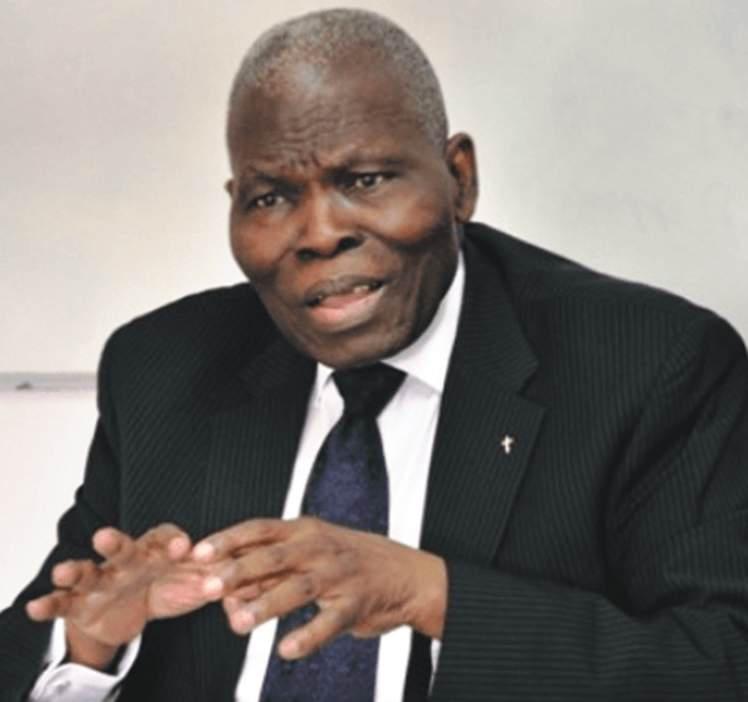
Kolade has seven simple principles to corporate life. These principles are that “people are seeking to obtain some value that they consider to be of appropriate quality and worth to themselves; that people make business resources productive; that a company does not perform better than its people; that each person can give or demand his/her best; that people can usually do better because they can desire to learn; that people can apply the fruits of their learning and that success, failure and mistakes are opportunities for learning.
A Professor of Law and Senior Advocate of Nigeria (SAN), Professor Fabian Ajogwu, in his tribute to Kolade described the departed icon as “The Master Craftsman of Character.”
Ajogwu said that a great light has been extinguished with the transition of Dr. Christopher Kolade. He said: “We have lost our foremost teacher, a master craftsman whose primary material was not wood or stone, but human character and corporate conscience.
“He was a teacher of practice in the art of integrity, a curriculum he taught not from a textbook, but from the impeccable manuscript of his own life.
“In the lecture rooms of the Lagos Business School and the Society for Corporate Governance Nigeria, in the quiet moments of mentorship, his words were not just instructions;
they were invitations to a higher plane of existence where principle was non-negotiable and service was the highest calling.”
Ajogwu called Kolade “the guardian of our professional souls, a father figure who saw our potential long before we did, and a lighthouse whose beam cut through the fog of moral ambiguity.
“His true legacy is not merely in the policies he wrote or the titles he held, but in the enduring integrity of the countless professionals who proudly call themselves his students.”
He added that though the master has laid down his tools, “the workshop of virtue he built endures.
“The lessons of ethics, faith, and professionalism he imparted are now our sacred charge to uphold and pass on. He was a life of profound impact, beautifully lived. I have lost a revered mentor.
Speaking in the same vein, the Chief Executive Officer of BIC Consultancy Limited, Dr. Boniface Chizea, said that with the unfortunate loss of Dr. Christopher Kolade, the number of remaining genuine icons of Nigeria has further diminished.
Chizea said that Kolade belonged to a rare and disappearing breed of Nigerians who were formed after the manner of Judeo-Christian ethics: those who bring pristine values to the table.
He said: “They are refined and well educated; they are not loud, they are not stylish; they are not greedy. They are conservatives who are simply contented.
“Have you heard and listened carefully to Kolade speaking the English language? His clear articulation sends a clear message of one
who was formal exposure in that space. He spoke the English language flawlessly, a clear evidence of his background as a broadcaster.”
Chizea recalled that his first knowledge of Kolade “was upon my return from Manchester to Nigeria when my sister in law worked with him as his personal secretary at Cadbury.
“In that position, it is saying the obvious to observe that she knew him close up, and she did have many positive things to say about his integrity.
“He was a verbal disciplined administrator who was not concerned about his personal comfort and did not have the usual what is in it for me mentality.
“And after all his grand tours as Nigeria Ambassador to the United Kingdom and numerous other board appointments often as Chairman, he still retained the servant leader profile to accept to be saddled with the responsibility of the formation of students and managers the correct orientation by accepting a teaching appointment with the Lagos Business School.
“We will not find many with such humility to accept a teaching job at that stage in their lives. And by all counts, he submerged himself to the job as he gave as must be expected a good account of himself even as he left robust legacies at the school.
“The content of his character and the value he espouse could be fully gleaned from the fact that when he could not cope with the crude shenanigans of politicians, he resigned from his appointment as chairman of Sure-P. How many other Nigerians have you heard resigned from such appointments?”
According to the former Editor/Managing Director of Independent Newspaper, Mr. Ikechukwu Amechi, wrote in 2022 that Kolade’s has been a most-fulfilling life, describing him as a teacher, media aficionado, administrator par excellence, boardroom guru, diplomat and academic.
“A man with the Midas touch, his stint at Cadbury Nigeria Plc where he was the managing director/chief executive officer and later chairman is still adjudged the golden era of the multinational company.
“The story was the same when former President Olusegun Obasanjo tapped him in 2002 to proceed to the United Kingdom as Nigeria’s High Commissioner.
“When he retired mid-year 2007 from the position, Britain knew that a different kind of diplomat had come to town.
“Unlike the axiomatic Jack of all trades who masters none, Dr. Kolade has excelled in all fields of human endeavour he ventured into,” Amechi wrote.
For his contributions to nation building, Kolade was awarded the national honour of Commander of the Order of the Niger (CON) in 2000. He was also a Fellow of the Institute of Directors, the Society of Nigerian Broadcasters, the Nigerian Institute of Management of which he was President from 1985 to 1988, and the Institute of Personnel Management in Nigeria where he served as President from 1988 to 1994.
For his devotion, in 1981, he received the medal of the Order of St. Augustine from the Archbishop of Canterbury and he is also a Lay Canon Emeritus of the Cathedral of the Holy Spirit, Diocese of Guildford in the UK.
Flutterwave, one Africa’s leading payments technology companies, has announced the relaunch of The Wave Podcast, featuring a compelling first-season lineup with innovators like Odun Eweniyi, Co-Founder & COO of PiggyVest; Fu’ad Lawal, Founder of Archivi. ng; and Ted Oladele, Founder of Mira & Lead Product Manager at Chowdeck.
The audio-led content was designed to share behind-the-scenes insights and authentic stories from the builders and thinkers driving growth across Africa’s technology and creative industries.
The Wave Podcast is returning with a focus on providing global and local stakeholders,
entrepreneurs, and professionals with deep conversations that explore the “why” behind Africa’s most dynamic stories and give access to unfiltered thoughts of the wave makers on the continent.
“When we first launched The Wave Podcast, it was a short but meaningful experiment. It gave us a taste of what it feels like to share stories about the African tech ecosystem with audio content coated in humour and practical experiences.
“Today, the ecosystem has evolved significantly, and now is the perfect time to bring back the conversations we started. This will give both African and global audiences access to unfiltered thoughts of those who are continually building, scaling, and leading the creative and technology
wave in the ecosystem,”a statement quoted Head, Branding and Storytelling, Flutterwave, Yewande Akomolafe-Kalu, to have said.
Other compelling guest lineups featured in the first season of the podcast include Flutterwave’s AVP Public Sector Funmi Olaniyi; Kennedy Offor, Lead, Sales & Partnerships, Chowdeck; Jennifer Onwudiwe, Head of Growth, Mono; and Seye Bandele, Co-Founder and CEO, PaidHR.
The Wave Podcast will serve as a hub for authentic knowledge on the African continent, a space where global stakeholders can access not only insights on innovation but also the mindset, resilience, and boldness of the disruptors shaping Africa’s future. The first episode went live on October 8th, 2025, and will be available across Spotify.
You could well describe it as a “smart campus” if we were to deploy a contemporary description, for an academic space which packed so much within its moderate geographical land area.
The University of Ilorin when it was birthed in 1975, germinated from the facilities of the erstwhile Government Technical College, Ilorin.
It equally appropriated adjoining parcels of land around and about it, where it sat between the thighs of Agbo-Oba and Adewole Estate, in the capital of Kwara State. While a futuristically planned, idyllic, eye-catching campus spread across a land area of more than 10,000 hectares was gradually in the works elsewhere in Ilorin, academic activities began decisively in the primal mini campus of the institution.
By the time I was admitted into the institution in 1982, the faculties of Arts, Social Sciences, Education and Clinical Medicine, were already domiciled in the fledgling school. So compact was that academe, that you could actually walk through the entire expanse in about an hour.
Extracurricular activities flourished side by side with approved academic curriculums. I was always inclined towards performing and creative arts, including acting and creative writing. Indeed, I acted the role of King Odewale in the classic play The gods are not to Blame, written by the renowned Nigerian first generation playwright, Ola Rotimi.
It was the convocation performance of the Kwara State College of Technology, (Kwaratech), Ilorin, just months before. As a student in the School of Basic Studies, (SBS) of the school where I wrote the Higher School Certificate Examination, (HSC) moderated by the University of Cambridge, I was auditioned for the role and selected. The University of Ilorin, which we abridged as Unilorin was going to provide more opportunities for the blossoming of this flair.
The Unilorin Creative Writers Group and the Ajon Players Drama Troupe were two extracurricular bodies which brought students together, outside the classroom space. David Cook, the venerated British scholar who nurtured several East African writers including Ngugi wa Thiong’o during his stint in Makerere University, Uganda, reenacted his baby project in Unilorin.
He developed a creative writing course for final year students of English, in addition to the writers’ group. The writers’ group drew enthusiasts predominantly from the Department of Modern European Languages, which prosecuted courses in English and French. The department has since been unbundled into separate departments for both pursuits. Notable members of the Unilorin Creative Writers Group included: Sola Babatunde, Tivlumun Nyitse, Blessing Wikina, Mopah Aileku, Sunnie Ododo, Wumi Raji, Rasheed Na’Allah, Hakeem Bello, Olufunmilayo Olusunle, (then Adedeji), among others. Guided by Cook and some
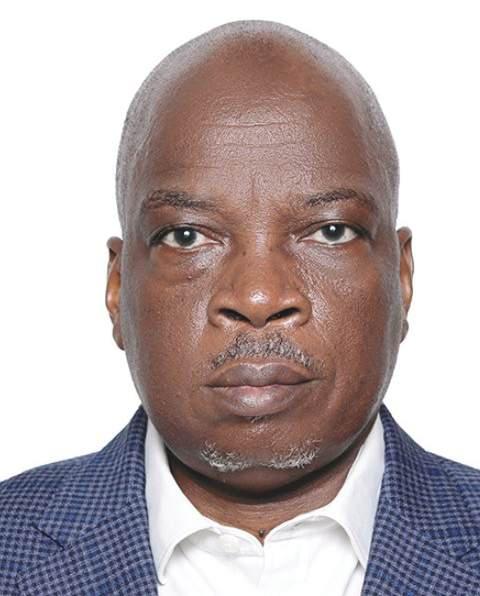
of our other teachers including Prayag Tripathi, (Indian); Russell Chambers, (American); Stephen Hesbon Lubega, (Ugandan); and Olu Obafemi, we met every week to discuss our teething efforts as cub writers. Some of us were concurrent members of Ajon Players which further cemented our friendships and relationships.
It was from this background that Hakeem Babatunde Bello and I met and became good friends and brothers. I was in my final year when he was in the first year, but this was no barrier between Hakeem and I. Indeed, I graduated in 1985, but returned two years later for a Masters when he was in his final year. Once I completed my postgraduate work in 1989, my eyes were focused on a career in the media, where a number of my classmates were already cutting their teeth.
I got a job in the Daily Times of Nigeria in Lagos in 1990, when the revolutionary, charismatic Dr. Yemi Ogunbiyi, was Managing Director. Hakeem was rounding up his Masters at the University of Ibadan at the time and he equally had abiding interest in the media. A second class upper honours degree graduate in English, I was sure he could contribute to the Ogunbiyi rebuild project in the Daily
Times.
In 1991, I was redeployed from the Sunday Times, my first stop in the newspaper octopus, to the Daily Times, the flagship of the organisation. My reassignment left a vacuum in the Sunday Times and I was desirous that Hakeem replaced me. I sure didn’t have the political or administrative leverage to bring him in at my level. But I had ideas which I believed we could explore. I tutored Hakeem to get referrals from any two of Ogunbiyi’s contemporaries whom Ogunbiyi held in very high esteem. I told him to speak with Professors Femi Osofisan, Niyi Osundare and Olu Obafemi. I assured him that recommendations from any two of these literary giants, all Emeritus Professors now, and all recipients of the Nigerian National Order of Merit, (NNOM), will easily sway Ogunbiyi. My suggestion worked. Hakeem was engaged. Ayo Akinkuotu, Wole Olatimehin, Maurice Ogar, Edwin Baiye, Gbenga Ayeni, all alumni of Unilorin were already embedded in the Daily Times system. Tunde Rahman joined us along the line. It was my privilege to help Hakeem acclimatise in his new official address.
Hakeem was deployed to the same responsibilities I handled at the Sunday Times. The brief necessitated standing astride the features and arts desks, and Hakeem acquitted himself competently. You couldn’t be a product of that premier university in the whole of present day Kwara, Kogi, and Niger states, without being a standout in your vocation. The University of Ilorin was the archetypal ilo-irin, the flaming forge where metals were beaten into shape. Hakeem and I had several editorial collaborations along the way. I was for instance, assigned a full page in the Daily Times on Tuesdays, beginning from early 1994, for topical interviews with a broad spectrum of societal concerns. The series was titled Dialogue this Week. Hakeem and I conducted a few such engagements including a very explosive one with Ken Saro-Wiwa, the famous Ogoni rights activist and prolific author. It was so insightful that it was serialised over two editions of the newspaper.
I dared the “lion’s den,” literally on one occasion, with Hakeem in tow. I wrote to Major General Mohammed Christopher Alli, the first Chief of Army Staff, (COAS), during the administration of General Sani Abacha, asking him for an interview. Alli acknowledged my correspondence, surprisingly and fixed a date for our engagement. I laugh out loud to myself whenever I remember how fear-frozen Hakeem was on that visit.
Olusunle, PhD, Fellow of the Association of Nigerian Authors (FANA), is an Adjunct Professor of Creative Writing at the University of Abuja
Funmi Branco
In Iperu-Remo, Ikenne Local Government Area of Ogun State, the distant sounds of automobiles on winding bush roads have been replaced by the roar of jet engines. What was once fields, red earth, and farmlands is now home to the Gateway International Airport and its companion aerotropolis — a bold experiment in crosspollinating infrastructure with agriculture, residential living, and international trade. Under the Governor Dapo Abiodun-led administration, the long-dreamed-of project long dreamed of, begun and got completed. Generally described as unprecedented delivery by a governor, is what many hope will be an avenue for growth of the South-West, particularly for Lagos, Ibadan, Abeokuta and the surrounding communities.
Proximity and strategic positioning
Ogun’s new airport is not located randomly. It is strategically placed near the Ilishan/Iperu-Ilisan Road, giving it unbridled access to the Southwest’s political, economic, religious and historical centres — Lagos, Ibadan and Abeokuta. The proximity means shorter haul times for cargo, less transit cost, and faster turnaround for perishable agricultural produce.
Linking major roads, especially the Lagos-Ibadan and Abeokuta-Sagamu-Ijebu-Ode-Benin expressways, means that goods arriving from remoter parts of Ogun or neighboring states like Oyo, Osun, Ekiti, and Ondo, will enhance trade and business, and most importantly, boost food security, with farmers, manufacturers, and air commuters not having to endure bad roads and traffic jams en route to an airport. They will also find a quieter, faster alternative to Lagos’ air traffic.
This airport, upon full operation with new airlines joining Value Jet, will cut hours off their journey, as traveling from Iperu takes less than an hour to reach Lagos, forty-five minutes to Ibadan, and barely thirty minutes to Abeokuta.
The centrality gives Ogun an unprecedented edge in logistics and investment attraction. This will give exporters the avenue to send produce directly from Iperu, hence relieving Lagos’ congested cargo terminals.
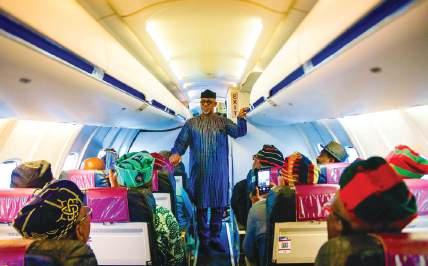
For Governor Abiodun, the site is “a smart decision to place Ogun at the heart of Nigeria’s logistics revolution.”
“It is no accident that this airport sits where it does.
“From here, goods, people, and opportunities can flow freely to the rest of the country and beyond,” he said during commissioning.
The room for cargo facilities and technology
According to state government releases, the runway is approximately four kilometres long, making it one of the longest in the country. It is built to accommodate large aircraft, which is significant for cargo capacity and international connections.
The airport is being fitted with cutting-edge navigational aids, ramp lighting, a 2-megawatt gas power plant, modern control tower, as well as advanced electronics for air traffic control and safety. These are not mere embellishments; they serve to ensure that operations can be reliable even under diverse weather conditions, and reduce operating costs and delays. To safeguard international standards, the airport is to be manned by several federal agencies: Nigerian Customs, National Drug Law Enforcement Agency (NDLEA), Police, and other regulatory bodies. This ensures that both import/ export requirements and security oversight are built in from
What is particularly striking about the Gateway project is that it has not been built as an isolated airport, but as the centrepiece of an aerotropolis. The idea is that around the airport you will have housing estates, commercial offices, logistics firms, agro-processing, real estate, and other businesses clustering to take advantage of proximity.
Some of the specific businesses, estates, and organisationsalready attracted or planned are:
The Gateway Aviation Village — a residential estate (Phase One of 100 units, fully sold; Phase Two of 200 units in progress) built to support those who will live, work, or do business around the aerotropolis. It comes with roads, fencing, drainage, security, electricity, water, etc; Gateway Aviation Estate; Special Agro-Processing Zone (SAPZ); potential Maintenance, Repair and Overhaul (MRO) facility, where a French aerospace firm, Dassault Aviation is considering establishing an MRO facility at the airport - an innovation that will project the Ogun Airport as one of the few airports in West Africa capable of servicing large aircraft; Nigeria Customs Training School, which will train customs officers on international standards and support regulatory needs tied to cargo operations.
These integrations mean that the airport is not just sending goods out, but creating businesses that support transit, processing, regulation, and living. It widens the economic footprint into real estate, hospitality, transport, manufacturing, and services.
The project, which is a testament of fulfilled promise, has provided tens of thousands of direct and indirect jobs. and community empowerment. The Aviation Village housing project used a direct labour approach. Commissioner for Housing, Jamiu Akande Omoniyi, reported that the construction of Phase One (100 housing units) created over 5,000 jobs, drawing from different skill sets: bricklayers, electricians, carpenters, plumbers, aluminum fabricators, etc.
Managing Director/CEO of Starzs Investments Company Limited and a Member of the Governing Board of the Nigerian Maritime Administration and Safety Agency, Iroghama Ogbeifun, embodies the power of resilience, vision, and self-belief in a world that often underestimates women in leadership. As the International Day of the Girl-Child casts global attention on the need to empower young girls to lead and innovate, Ogbeifun’s story stands as a compelling testament to what’s possible when determination meets purpose. From navigating a male-dominated oil and marine industry to mentoring young women in business, she continues to challenge stereotypes and inspire a new generation of female leaders. In this conversation with Nume Ekeghe, she shares her thoughts on leadership, the power of the mind, and the importance of education, mentorship, and excellence. Excerpts:
This year’s International Day of the Girl-Child focuses on empowering young girls to lead and innovate.What does this day personally mean to you?
For me, this means firstly removing mental biases that impede young girls from believing in their ability to lead and innovate. It means more representation of women in leadership and innovation, which shows young girls that it is indeed possible. It means creating platforms that train and equip young girls to lead and to innovate. It means intentionally providing opportunities for young girls to take up leadership positions.
Growing up, what shaped your confidence and ambition as a young woman, and how did your upbringing influence your journey to leadership?
Watching the women in my life pursue their dreams uninhibitedly and passionately. They did not allow society’s views of a woman’s place or human obstacles at work, stop them. They showed up and showed out every day. My mum, God rest her soul, Dr. Cecilia Ojezua, was an epitome of ambition, hard work, and beautiful grace. She served 30 years at NNPC Medical, across several locations, and eventually reached the General Manager level. She remains an inspiration to me every day and reinforces my belief that representation matters. I am because I saw her do!
Many girls in Nigeria still face barriers to education and self-expression. What do you see as the most urgent step society must take to change this?
The society is made up of all of us. You and me. So the steps to change begin with us. Begins in the homes. Parents telling their children that they are worthy, they are champions, they can succeed in whatever they put their minds to. The first builder of a child’s confidence begins at home and then at school. Education across Nigeria today should be free at least to the secondary school level. Access to education should be simplified and available to all, regardless of social status. Creating social welfare systems that empower parents and remove the need for children to work instead of being in school is necessary. If we must make a change, especially for the girl child, we must be intentional and deliberate.
As a woman leading a company in the marine and oil services industry, a space often seen as male-dominated, what personal challenges did you overcome, and how did they shape your leadership philosophy?
I faced doubt in my competence, I faced accusations of emotional decisions due to being a woman, I faced sexual harassment, and I faced disrespect. I have dealt with these challenges by removing my gender from interactions. In my mind, when I walk into a room, I am simply a human being, an intelligent one at that, who has value to bring to the table and I focus on delivering that value. I believe that excellence speaks for itself and earns even grudging respect. This has helped a lot, focusing on excellence. How important is mentorship in closing the gender gap, and do you currently mentor or support young women in business? Mentorship is important because it brings young people in touch with the representation of what is indeed possible and how to achieve it, too. I currently support various young women in business through funding

and coaching.
In your opinion, what misconceptions about women in leadership persist in Nigeria, and how can women leaders dismantle them through example?
That women in leadership do not support other women, and that women cannot work together. These are myths that have been proven to be false time and time again through various examples. Again, representation is important to dispel these negative narratives because I believe that if more women partnerships are showcased, it will encourage more of such to emerge. The women-focused associations play a significant role in such showcases.
How can corporate Nigeria play a stronger role in advancing girlchild education and empowerment, beyond token CSR initiatives?
I believe the instructive word here is “token”. I think Meaningful CSR initiatives that are sustainable remain a powerful tool for corporates to make change and impact. So I believe that transforming CSR projects beyond a box-ticking exercise to well-thoughtout and strategic exercises will advance girl child education.
What advice would you give to

young girls who aspire to break into industries that society often tells them “are not for women?
Rise above the mental bias in your own mind. Once you believe in yourself, you can
drown out the noise. Look around you, women are smashing those ceilings and breaking those barriers. If they can do it, then so you can! Namibia just became the first African country with an all-female leadership in government! It is possible!
Balancing leadership and family life is often seen as a difficult act. How do you personally navigate both worlds without losing your sense of self?
Well, I practise the principle of work-life prioritisation, which entails me prioritising different aspects of life and work per time depending on the nature of the responsibility. I apply the glass ball versus plastic ball technique. This has helped me reduce mum guilt and show up for my family, myself, and my work.
You’ve often spoken about discipline and purpose as key drivers of success. How do you instill these values in your children and the young people who look up to you?
First of all, I exemplify these values consistently. I speak about them and I live them. I realise that children will do what you do not what you say. Young people will emulate what they see works for someone they look up to, which means putting words that they believe in into action.
The girl-child conversation is not just about empowerment but also protection — from abuse, discrimination, and early marriage. How can parents and communities do better in safeguarding the girl-child?
By accepting and stepping into their responsibility as protectors, not hiding perpetrators and being silent in the face of abuse. Society must recognise the God given power of the girl child and the important role that she plays in communities, as a child and eventually as an adult. After all, they say if you want to educate a nation, educate a woman. So instead of fighting to silence it, to kill it, rather embrace it, nurture it, and help it thrive.
In your journey as an entrepreneur and leader, were there moments of doubt or failure that taught you lessons you now pass on to younger women?
Oh, certainly, many times. Even now, as recently as last weekend, I suffered from doubt, but I have a ‘why’, a purpose that is greater than my fear of failure or doubt. It is this ‘why’ that keeps me going, keeps me believing, and keeps me motivated to stay the course and never look back. So my advice is to find this ‘why’, your purpose. What makes you trudge on, even when upon feel like giving up? Whatever it is, find it and hold on to it. I have also accepted failure as part of life’s journey. I do not let it cripple me or hold me back. Rather I embrace it with all the lessons that it brings, I feel all the emotions and then I pick myself up and keep moving.
Finally, what message would you like to leave with every young Nigerian girl on this International Day of the Girl-Child?
I will tell them that the biggest obstacle to your greatness is your mind. If you win the battle in your mind, then you have won, period. Nobody can hold you back from achieving whatever you set your mind to. Your circumstances do not determine how far you can go. Dig deep and be excellent at whatever you put your hands and your heart to. The world respects excellence, grudgingly or not.
Ibiso Oprite Amachree and Oboma Oprite Amachree
In the oil-soaked heartlands of Nigeria’s Niger Delta, where environmental degradation meets economic promise, Dr. Samuel Ogbuku stands as a polarising figure. Appointed Managing Director and Chief Executive Officer (MD/CEO) of the Niger Delta Development Commission (NDDC) in August 2023 by President Bola Tinubu, Ogbuku, a Bayelsa-born scholar and activist, inherited an agency long plagued by scandal, corruption, inefficiency, and unfulfilled mandates.
At 50 years old as of August 2025, the PhD holder in political and administrative studies has steered the NDDC toward what he calls “Transaction to Transformation” – a shift from bureaucratic inertia to tangible, people-centered development.
Yet, for every bridge built or light switched on under his watch, Ogbuku faces a barrage of orchestrated opposition. Political rivals, disgruntled contractors, and media outlets have launched relentless campaigns to discredit him, from fabricated spending scandals to calls for his ouster. Why the ferocity? Insiders point to Ogbuku’s rising star – he’s been tipped as a frontrunner for Bayelsa State’s APC governorship ticket – and his unyielding push against corruption, which threatens entrenched interests. This article delves into Ogbuku’s undeniable achievements at the NDDC and unpacks the shadowy forces hell-bent on his downfall, drawing from official records, media reports, and social media discourse up to October 2025.
A Legacy of Impact: Ogbuku’s Transformative Tenure at NDDC
Ogbuku’s arrival at the NDDC marked a pivot from the agency’s notorious history of forensic audits and leadership upheavals. Under previous regimes, billions in funds vanished into abandoned projects, leaving the nine Niger Delta states – Abia, Akwa Ibom, Bayelsa, Cross River, Delta, Edo, Imo, Ondo, and Rivers – mired in poverty despite their oil wealth. Ogbuku, drawing from his roots as a former Ijaw Youths Council leader, has refocused the commission on President Tinubu’s “Renewed Hope” agenda, emphasising sustainability, infrastructure, and human capital.
Infrastructure Renaissance: Lighting Up the Delta
One of Ogbuku’s flagship initiatives, the “Lighting Up The Niger Delta” project, has electrified remote communities, earning him a nomination for the 2025 African Public Service Excellence Award in Marrakesh, Morocco. This groundbreaking effort, hailed by the African Heritage Concert and Awards, involves deploying solarpowered grids and grid extensions to over 200 communities, reducing reliance on costly generators and curbing oil theft by illuminating illegal bunkering sites. “Among his most notable achievements is the groundbreaking ‘Lighting Up The Niger Delta’,” noted Business Insider Africa, crediting it with boosting nighttime economic activities like fishing and small-scale trading.
Beyond power and electricity, Ogbuku has supercharged roads and bridges construction.
In 2024 alone, the NDDC completed 150 kilometers of intra-state roads, including the critically delayed OgbiaNembe Road in Bayelsa, connecting flood-prone villages to markets. Shore protection projects in erosion-ravaged areas like Ayakoro, his hometown, have saved farmlands and homes from Atlantic incursions. At the 2025 Nigerian Bar Association conference, Ogbuku pledged continued support for waterway security to unlock the “blue economy” – fisheries, aquaculture, and maritime trade – projecting it as the region’s post-oil future.
“The blue economy is central to the future of the Niger Delta,” he declared, committing NDDC resources to naval patrols and eco-friendly ports.
Empowering Lives: Health, Education, and Youth Innovation
Ogbuku’s human development agenda is equally robust. Biannual free medical outreaches have screened over 50,000 residents for ailments like hypertension and malaria, with mobile clinics reaching riverine settlements inaccessible by road. In partnership with state governments, the NDDC has rehabilitated 30 rural health centers and built three specialist hospitals in Delta and Rivers States, focusing on maternal care to combat the Delta’s high infant mortality rates.
Education has seen a surge too: 120 classroom blocks erected in under-served schools, equipped with digital labs under the “NDDC Digital Delta” initiative. Central to this is the Foreign Postgraduate Scholarship Scheme, launched in 2010 to train and equip Niger Delta youths in fields like engineering and environmental science.
Prior to 2023, it averaged 200 awards yearly amid delays and mismanagement, yielding over 1,400 alumni by 2025. However, the program was notoriously plagued by corruption and abandonment: a 2019 forensic audit exposed rampant fraud, with suspicious claims surging from $900,000 in 2018 to $9 million in 2019, billions misappropriated, and funds allegedly diverted to officials’ accounts.
The 2019 group was left stranded abroad without fee payments, sparking protests in the UK and accusations of unethical conduct, while no new scholarships were awarded from 2019 onward due to ongoing probes, unclear selection procedures and administrative delays that fueled scams and limited return of graduates.
Under Ogbuku, it has awarded 589 slots since 2023 (189 in 2023, 200 in 2024, and 200 in 2025), with merit based selection via CBTs and interviews ensuring excellence. Scholars have shone abroad: 11 from the 2023 group earned Distinctions at Coventry University in 2024, followed by 32 more in 2025, as Ogbuku celebrated at graduations.
In June 2025, he expanded access with a local scheme for 600 beneficiaries in Nigerian universities. This ties into youth empowerment, where Ogbuku’s sponsorship of the Port Harcourt Tech Expo 2025 trained 5,000 young entrepreneurs in AI, coding, and agrotech, fostering startups that process local palm oil and cassava into exportable goods.
“I am proud of Dr. Ogbuku and what he has achieved in the NDDC,” tweeted Bayelsa Governor Douye Diri on Ogbuku’s birthday, highlighting these programs’ role in curbing youth restiveness.
Governance Overhaul: From Corruption to Accountability
Ogbuku’s internal reforms are perhaps his boldest stroke. He institutionalized Alternative Dispute Resolution (ADR) mechanisms, reducing workplace litigation by 40% and promoting a “culture of accountability,” as he emphasized in a September 2025 sensitization program. The 2024 NDDC budget, defended vigorously before the National Assembly, prioritized “legacy projects” with participatory budgeting involving community stakeholders – a first for the agency.
Even the Economic and Financial Crimes Commission (EFCC) has lauded Ogbuku’s anti-graft stance. During a 2024 courtesy visit, EFCC Chairman Ola Olukoyede praised the NDDC’s “Rewind to Rebirth” initiative, a forensic cleanup of legacy debts that recovered N15 billion in diverted funds. “From his presentation, you can see that he is somebody who is ready to bring a change,” Olukoyede said, envisioning an NDDC as a “symbol of pride, accountability, and transparency.”
Ogbuku’s Intellectual Contributions Amplify His Legacy
In August 2025, he launched two books – Strategies & Imperatives for Developing the Niger Delta and Rethinking the Niger Delta – at his 50th birthday events in Abuja and Port Harcourt. Reviewed by poet Ogaga Ifowodo as a “fierce urgency”for regional equity, these works propose federal-state pacts for resource control and climate adaptation, influencing policy debates.
These strides have tangible ripple effects: Unemployment in pilot communities dropped 15%, per NDDC metrics, and inter-state trade volumes rose 20 percent due to better connectivity. Alumni, family, and associates celebrated these at a September 2025 tribute, calling Ogbuku a “man of few words but many achievements.”
For all this progress, Ogbuku’s path is littered with sabotage. “They want to bring him down at all costs,” lamented a Pan Niger Delta Forum (PANDEF) spokesman in August 2025, pointing to a web of political, economic, and media machinations.
Ogbuku’s APC affiliation and governorship buzz have irked rivals. In July 2025, “political opponents” launched a smear campaign falsely linking him to ex-President Goodluck Jonathan’s camp, aiming to “rubbish his image ahead of primaries”. The Niger Delta Youth Council debunked it as “baseless,” but the damage lingered. Sponsored protests in February 2025 decried his leadership as “anti-people,” with groups like the Ijaw Publishers Forum (IPF) in August demanding an EFCC probe into “suspected corrupt activities.” IPF’s call, echoed on X, cited opaque contracts, though no evidence surfaced. Rumors of rifts – like a debunked February 2025 clash with FCT Minister Nyesom Wike – fueled the fire. NDDC’s official response: “No rift exists.” Analysts trace these to Ogbuku’s transparency push, which blacklists non-performing contractors, many tied to PDP stalwarts.
The Birthday Scandal Ogbuku’s August 19, 2025, 50th birthday crystallised the opposition. Reporters alleged a N5 billion NDDC-funded

Ogbuku
extravaganza, complete with “after-parties.” The truth? Modest events: book launches, a Port Harcourt dinner, and a thanksgiving at St. Mark’s Anglican Church in Ayakoro, all privately sponsored. NDDC’s September rebuttal called it “malicious,” while attendees like Bishop Tamunotari Obaze praised Ogbuku’s “humility.”
Corruption accusations to unverified “multiple sources” – reeks of agenda and has become a rumor mill, critiqued media analyst Dr. Florence Ayikuro. X users amplified the debunking, with @PH_Socials labeling it “propaganda” from “disgruntled contractors” seeking revenge for lost bids.
Deeper Motives: Protecting the Status Quo
Why the intensity? Ogbuku threatens a corrupt ecosystem. His ADR and debt recovery have clawed back funds from “fifth columnists” – insiders siphoning allocations. As one X post noted, “High-placed persons sponsor sabotage” to reclaim influence. In a region where oil funds breed patronage, Ogbuku’s merit-based contracts and blue economy pivot, sideline middlemen profiting from chaos. Critics like Victor Olale in Political Economist interrogate the birthday optics amid poverty, but even they concede: “Extravagance contrasts with needs, yet his projects transform lives.” The IPF probe call, per PENGlobal, stems from “intensified” grudges over excluded publishers in NDDC contracts.
Conclusion: Resilience in the Face of Storm Ogbuku’s NDDC tenure – from electrifying villages to empowering minds – has injected hope into a forsaken Delta, aligning with President Tinubu’s vision of equitable growth. Yet, the “at all costs” assaults reveal Nigeria’s underbelly: where progress invites persecution from those wedded to plunder.
As Ogbuku turns 50, his story is unfinished. PANDEF’s Godknows Igali commended his “efforts towards development,” urging resilience. For Niger Deltans, the choice is stark: back a reformer or yield to saboteurs. Ogbuku’s books remind us: Rethinking the Delta demands fierce urgency. In bridging divides – literal and figurative – he embodies that call. The lights he ignited may flicker under attack, but they won’t go out. The Delta’s dawn is here; its guardians must defend it.
Ibiso Oprite Amachree (18), Convener of the Youth for Change Initiative is a 200 level Computer Engineering student at the Rivers State University and Oboma Oprite Amachree (17), is the Co-Convener is a 200 level Mechanical Engineering student at the Rivers State University.
Aremittance tax of one percent for certain funds going out of the USA was signed into law on July 4, 2025, via the One Big Beautiful Bill Act (OBBBA), with a planned implementation date of January 1, 2026. (Mayer Brown, 2025) (Wise, 2025).
Under the bill’s text, each cross-border remittance will be charged a tax of 1%, subject to certain terms and conditions.
Liability rests with the sender, but the remittance transfer provider must collect the tax at the time of transaction and remit it periodically to the U.S. Treasury. If the provider fails to do so, it may also be held liable. Crucially, the statute targets cash-like funding methods: cash deposits, money orders, and cashier’s checks fall within scope — whereas transfers funded via U.S. bank accounts, credit cards, or debit cards are expressly excluded.
For senders, the implications are clear: Your funding source determines tax exposure; Cashbased methods will likely incur the 1% excise; And remittance companies will implement new pricing and compliance protocols accordingly.
Although one percent seems negligible, this amount begins to add up as the volume increase and research suggests that even small increases in transfer costs can shift remittances toward informal and less regulated channels such as travel cash and peer-to-peer (p2p) transfers. A study estimates that a one percent tax could reduce formal, cash-based remittances by about US$2.7 billion in 2025 (≈2.66%) globally (AidData, 2023).
While this is an imminent development that will affect how, when, and what funds are sent
Ani bassey-eyo
Iby immigrant nationalities resident in the US, the implications for developing countries like Nigeria are far-reaching. This shift in the global remittance landscape presents both a reality check and multiple opportunities to re-evaluate the question: How can we maximize the power of diaspora capital — to catalyze sustainable growth, expansion, and development?
In 2023, remittances to low- and middle-income countries (LMICs) reached about US$669 billion, growing roughly 3.8% over the prior year despite global inflationary pressures. (World Bank, 2023a). Nigeria alone reportedly received more than US$20 billion from its diaspora in that year (Reuters, 2024), not even counting informal channels or travel cash. This amount in some years was almost comparable to Nigeria’s main export revenue streams, Crude oil. Yet we have only begun to scratch the surface of what this volume of funds can achieve for nation-building. These numbers tell a powerful story — not just of generosity, but of untapped potential. By channeling even, a fraction of these inflows into structured investments, Nigeria can transform remittances from short-term support into long-term national assets. With this scale of remittance inflows, Nigeria now has a unique window to reimagine how diaspora contributions are deployed; the initiatives below outline concrete pathways for turning these funds into lasting development impact.
Nigeria has already demonstrated proof of
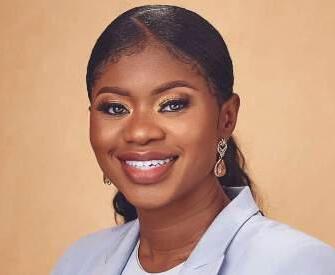
concept. In 2017, the federal government raised US$300 million through its first Diaspora Bond, at a coupon rate of ~5.625% over five years. The issuance was oversubscribed (~130% subscription), showing strong demand from Nigerian Diaspora for structured investment instruments tied to national development (Debt Management Office Nigeria, 2017). We can continue to build on this precedent by creating new bond tranches targeted at critical sectors — education, healthcare, infrastructure — converting part of existing consumptive or new remittances into productive capital that yields returns, improves quality of life, and generates employment.
Diaspora investors often accept slightly lower financial returns in exchange
for higher social or patriotic impacts. This “patriotic discount” can be leveraged if there is trust, clear governance, and proper oversight. Some examples of leveraging this include: ·Peer-to-peer/crowdfunding models: Nigerians abroad could pool capital to fund viable business or community projects back home, with transparent reporting, risk assessments, and clear ROI metrics.
Diaspora investment funds: The Nigerian government mentioned in 2024 that it was exploring a US$10 billion diaspora fund, intended to channel remittance flows and diaspora savings into multi-sector investments (infrastructure, health, education) (Reuters, 2024). This shows willingness and the opportunity to transform remittances into instruments with multiplier effects.
We must transform our perspectives of remittances from one-dimensional (i.e., purely for family or consumption) to a multi-allocation model. This model could look like Traditional support (family & friends) - 50%, Community/ philanthropic investments (scholarships, clinics, skills training – 25%, Financial instruments with returns (bonds, mortgages, T-bills, etc.
Akoroda, Senior Account Manager at Amazon Web Services, U.S.A, is a finance and technology leader with 10+ years across banking, fintech, and digital innovation
Read full article online - www.thisday-
ve spent the past few years helping teams turn sustainability talk into tangible, investable action. In Nigeria, we are at a crucial inflection point. The National Council on Climate Change (NCCC) has begun to set the rules of the road, positioning the BTR2 and NC4 (the Second Biennial Transparency Report and the Fourth National Communication) as central tools for tracking progress and driving data-driven climate action.
As Dr. Chukwuemeka Okebugwu, Assistant Director at the NCCC, recently noted, this process has the potential to create a strong institutional framework, one that enables seamless data flow and ensures high-quality reporting nationwide. That backbone, if designed well, is what will transform climate ambition into bankable outcomes.
Registries: More Than Paperwork
Let’s be clear: registries are not “nice to have.” They are the ledger of trust. Without a credible national system, investors cannot properly price risk, companies cannot plan effectively, and communities rarely see durable benefits.
We don’t need to reinvent the wheel. Kenya’s regulations offer a strong benchmark, embedding community benefit-sharing and providing clarity on how the national registry operates. South Africa adds another lesson: connect your registry to fiscal incentives and you attract real capital. Nigeria can, and should, adapt both approaches.
The Private Sector is Already Moving
It’s important to recognize that our private sector is not waiting on the sidelines. Platforms like Netzence’s CloseCarbon are already onboarding Nigerian corporates. That momentum is valuable, but it needs to align with the NCCC’s National Carbon Registry and authorization processes to prevent fragmentation or double counting.
Think of it as building railway tracks: the national registry sets the rails, private platforms help scale onboarding, and businesses gain a reliable path from project to credit to claim. Everyone wins when the system is coordinated.
Integrity and Incentives Matter
If Nigeria wants to attract ESG-aligned capital, integrity cannot be optional, it must be designed into the system. That means raising the bar on MRV (measurement, reporting, and verification), clarifying which standards and claims are acceptable, and publishing a clean, API-first roadmap for the registry.
On incentives, simplicity is key. We could pilot tax or import-duty relief tied to verified outcomes, earned only at credit retirement. Predictable, performancebased incentives give CFOs a reason to commit and developers a reason to build.
This is not an abstract conversation. Nigeria’s BTR
Perching Hawk
It is globally accepted that meaningful national socio-economic development is hinged among others on the ability of governments to provide enabling environments for the private sector to thrive, particularly in free market economies like Nigeria. Such enabling environments are aimed at stimulating increased local and foreign direct investment in manufacturing, innovations, competitiveness and other market driven economic activities to engender increase in capacity utilization by existing industries, generate new job opportunities, create more wealth, and promote citizen welfare, thus alleviating poverty. Through policy initiatives, incentives, robust regulatory regimes supporting consumer and environmental protection among others, Governments are deliberate in the
efforts to provide enabling environments for the private sector
Some of the initiatives in Nigeria were the creation of Special Economic Zones (SEZs) popularly called Free Trade Zones, which are critical components of contemporary economic strategy, particularly for nations seeking to enhance their competitiveness in the global market. SEZs are designated geographic regions within a country that operate under different economic regulations than the rest of the country, aiming to attract foreign direct investment (FDI), promote manufacturing, and encourage exports. These zones often benefit from tax incentives, streamlined regulations, and infrastructural support, making them appealing for businesses looking to establish operations in emerging markets like Nigeria.
In the Nigerian context, there has been concerted effort to develop
FTZs as part of a broader strategy to diversify the economy, reduce dependency on oil revenues, and encourage sustainable development. Many countries have successfully leveraged these mechanisms to foster economic growth, attract investments, and create jobs. The government has initiated policies aimed at facilitating the establishment of these economic zones, positioning Nigeria as a competitive player in the African and international markets.
cycle (Biennial Transparency Report) is already forcing better data practices. Exporters are feeling the heat of tightening disclosure requirements and CBAM-style (CBAM-style are mechanisms similar to the European Union’s Carbon Border Adjustment Mechanism (CBAM), which aims to put a fair price on the carbon emissions of imported goods, prevent “carbon leakage,” and encourage cleaner production in non-EU countries) pressures from global markets. Communities are demanding benefits that are tangible and recurring.
A credible national registry is the bridge between these pressures and opportunities. It’s how we turn today’s pilots into a steady pipeline of high-quality mitigation outcomes that global buyers are willing to pay for. More importantly, it ensures those proceeds build real resilience at home.
If we get the plumbing right, the capital will follow. bassey-eyo is Managing Director, LANI Group
Tax Incentives Offered in Nigerian FTZs Nigeria has established several FTZs as part of its economic strategy to attract foreign investment and stimulate local businesses. One of the principal attractions of these FTZs is the range of tax incentives provided by the government to businesses operating within their confines. These incentives are designed to create an enabling environment for investment, while simultaneously fostering economic development and job creation.
One of the most significant incentives is the corporate tax holiday available to eligible enterprises. Under this policy, companies can enjoy complete exemptions from corporate income tax for a period, usually ranging from three to five years, and potentially extendable based on performance and compliance with specific conditions. This feature significantly enhances the cash flow of businesses, allowing them to reinvest profits into growth and expansion efforts. Moreover, duty exemptions on imported goods are another attractive incentive. Businesses operating within FTZs can import raw materials and equipment without incurring customs duties. This not only reduces operating
costs but also encourages companies to source high-quality inputs from abroad without the financial burden of tariffs. Alongside this, the government offers value-added tax (VAT) waivers, which remove VAT on goods and services consumed within these economic zones, further easing financial pressures on businesses. In addition to these direct financial incentives, the Nigerian government has also introduced various other incentives aimed at boosting investment in FTZs. These can include reduced utility costs, grants for setting up businesses, and supportive regulatory frameworks that streamline operations. Collectively, these incentives are designed to make Nigerian FTZs an attractive option for both domestic and international investors, ultimately contributing to the country’s economic growth and diversification goals.
Other Incentives Available to Businesses in FTZs
There are primary benefits of locating a business in an FTZ. Some of these benefits are:
For many Nigerian workers, the struggle to stretch their salaries until the end of the month has become a familiar cycle. It is not uncommon to hear complaints about wages running out long before the next payday, often blamed on inflation, inadequate pay, or the soaring cost of living.
A report by Jobberman affirms further that over 60 percent of Nigerian workers live paycheck to paycheck, pointing to a significant portion of the workforce struggling to make ends meet until the next salary arrives. While economic factors highlighted earlier count, financial analysts assert that even high-income earners are not completely immune to living paycheck-to-paycheck.
Salary increments from time to time have not made any difference, just as the recent 133.3 per cent raise in national minimum wage has not eased household pressure.
A professor of economics and business, Stephen Onyeiwu said only about eight percent of Nigerians (or 16 million), mainly in the public and “high-end” private sectors actually benefit from a minimum wage increase.
Where this issue has remained perennial, a wealth coach, Adnan Saani submitted that the real issue lies less in how much people earn but more in how they manage what they have.
Sanni in a recent finance conversation tagged, ‘the Money rules every African Must Know, maintained that many across Africa, especially Nigerians, lose money not because they don’t make enough, but due to costly financial mistakes, including elevating their lifestyle upon salary raise.
the wealth advisor stressed that even on modest incomes, individuals and households can thrive against all odds, by following sound money principles and avoiding costly money missteps. He presented some of these common mistakes and how to steer clear of them below:
Higher Spending with Higher Income

A common mistake among many is increasing their lifestyle as soon as their income rises. From new cars and gadgets to bigger apartments, many treat every pay raise as permission to spend more. this culture of showing often leads to a paycheckto-paycheck cycle, regardless of how much one earns. the key is to maintain discipline when income increases, channel the extra income into savings or investments instead of luxury. true financial growth is quiet and intentional, not flashy or reactive.
Overlooking Small, Recurring Expenses
It’s not always the big-ticket items that ruin finances; often, it’s the small, unnoticed leaks. Daily snacks, streaming subscriptions, data renewals, and spontaneous rides may seem harmless individually, but they silently drain income over time. conducting regular expense reviews helps identify waste and redirect money toward savings or investments. Discipline with small expenses builds the foundation for bigger financial wins.
Saving What’s Left Instead of Saving First Many people say, “I’ll save whatever remains at the
end of the month.” the problem is, nothing ever really remains. between bills, outings, and spontaneous spending, saving becomes an afterthought. the smarter approach is to treat savings like a mandatory expense, set aside a fixed amount immediately after receiving your income. Automating this process builds discipline and consistency, helping you grow an emergency fund that provides stability when life takes an unexpected turn.
Misusing Debt and Credit
In today’s Nigeria, access to quick loans is easier than ever: from digital lenders to buy-now-paylater services. but what many fail to realise is that easy credit can quickly become a financial trap. borrowing for consumption rather than productivity creates long-term strain, especially with high interest rates and hidden fees. Debt should serve as a bridge to opportunity, not a trapdoor into poverty. Understanding loan terms, paying balances promptly, and avoiding unnecessary borrowing can keep one financially stable.
Delaying Investment and Retirement Planning Many young Nigerians postpone investing because
they believe they don’t have enough money to start. Yet, the real advantage of wealth-building lies in time, not in the amount invested. Starting small, either through mutual funds, pension contributions, or cooperative schemes allows compounding to work in your favour. Waiting for the right time to invest often means paying the price of lost years later.
Without clear goals, money decisions become impulsive. too many people spend based on emotion or peer influence instead of planning for defined objectives. Setting realistic, measurable financial goals like saving a set amount for property, business, or retirement gives direction to spending and helps measure progress. A goal-driven budget ensures that every naira has a purpose.
Measuring Success by Appearance
Perhaps the deepest cultural flaw in our money habits is the obsession with appearances. In Nigeria, people often equate wealth with visible consumption like the designer outfits, flashy cars and lavish parties, amongst others. Yet true we are often quiet, it’s about peace of mind, financial security, and freedom from debt. redefining success as financial stability rather than public validation is the first step to long-term prosperity.
Many Nigerians were never taught how money truly works. Schools often skip basic lessons on budgeting, savings, compound interest, and debt management. As a result, most people believe financial wisdom comes naturally once they start earning, but ignorance can be very costly. taking the time to learn about money through credible platforms like podcasts, books, and financial literacy classes is the first step toward financial security. Understanding the basics of how money grows and how debt works helps you make smarter decisions and avoid costly traps.
A new report by e-commerce platform, Jumia has highlighted how rural regions are fast embracing and driving e-commerce growth in Nigeria.
this trend, findings show, is driven by rising digital literacy, social media influence, internet access, and the appeal of affordable, quality options and convenience offered by the onlineSpecifically,platform.the second edition of the Jumia’s flagship report ‘e-commerce in rural Areas’ revealed that rural regions now account for nearly half of all packages delivered on the platform.
From Jumia’s end, corporate efforts like investments in infrastructure, trust-building initiatives like refund policy,
expanded pick-up stations and its JForce programme, an independent sales network empowering local communities, amongst others are said to have collectively driven adoption in remote communities. the company noted in the report that secondary cities and rural areas are now promising frontiers for market expansion, where the e-commerce sector continues to mature.
Demands in these regions as drafted in the report are driven by product categories such as phones, beauty products, home essentials, men’s clothing, and footwear topping the list of most purchased items.
the boom in these regions too is reported to have also
positively impacted the company’s performance in Q2 2025, leading to a 25 percent surge in order volume and 36 percent year-over-year increase in Gross Merchandise Value (GMV). the report which was launched at Jumia’s head office in Lagos recently, brought together key stakeholders including media representatives, government officials, vendors, logistics partners, and members of the Jumia community.
Speaking, chief executive Officer of Jumia Nigeria, temidayo Ojo, reaffirmed the company’s commitment to inclusive growth in over 13 years in business, stressing the firm’s priority to making everyday life easier for Nigerians wherever they are.
Digital marketplace for services, HAGO Africa has launched in Nigeria’s market to address long-standing trust and efficiency challenges that plague the country’s informal service sector. the platform connects customers to verified artisans and professionals in their locality, providing a safer and faster way to book services through features such as location-based search, escrow payment, and in-app messaging.
Speaking during the launch, Founder and chief executive Officer of HAGO Africa, Samuel Imoisili, explained that the platform was designed to deal with credibility and
accountability hurdles within Africa’s service industry.
“Our mission is simple — to build trust where it’s been missing. For years, customers have struggled with unreliable vendors, while skilled professionals have found it difficult to prove their credibility. HAGO changes this by making every connection transparent, secure, and built on accountability,” he explained.
tLG capital (tLG) has closed a US$10 million facility for VivaJets, a subsidiary of Nigerian aviation services platform, Falcon Aerospace limited. the financing structured in partnership with Wema bank, will retire an existing local-currency facility previously deployed for aircraft acquisition and fleet expansion.
According to both parties, the transaction marks the first internationally structured aviation financing for a Nigerian air operator, which will also boost intra-African connectivity.
Speaking on the deal, chief Operating Officer of Falcon Aero, tejumade Salami, described the partnership as a breakthrough for the company and the wider aviation sector.
“We spoke to many lenders, but tLG solved it. their structured-solutions mindset turned a complex funding puzzle into a single, bankable facility. With this facility, we have retired legacy obligations and can now focus on delivering a seamless experience for our clients across the region,” she stated.
She added that the facility would further ensure that the company significantly reduces the revenue and cash flow expended on interest and debt service.
Partner, tLG capital, Isha Doshi, said the investment underscores tLG’s commitment to improving Africa’s connectivity through sustainable private capital.
“Vendors on the other hand gain increased visibility, access to new clients, and digital tools that encourage professionalism through transparent pricing, prompt communication, and reliable service delivery.”
Overall, Imoisili said the company’s broader goal remains to formalise and professionalise Africa’s service economy via the innovation.
He informed further that the platform enables users to search, chat, book, and pay service providers directly within the app, different from traditional word-of-mouth referral system. He affirmed that this model ensured that transactions are documented and payments safeguarded.
remita has reaffirmed its commitment to driving Nigeria’s digital transformation with its sponsorship of the Nigeria Fintech Week (NFW) 2025.
this year marks the fourth time consecutively that remita will be partnering with the programme’s organisers, FintechNGr towards driving the objective of the initiative.
this year’s edition with the theme, “the Fintech ecosystem Symphony: Orchestrating Nigeria’s Digital Future,” brought together regulators, innovators, investors, and ecosystem enablers to discuss how financial technology can power inclusive national growth.
Managing Director of remita, ’Deremi Atanda,
said partnering with the initiative aligns with the company’s mission to deepen financial inclusion and strengthen trust in Nigeria’s digital systems.
“We believe digital financial infrastructure should catalyse the growth of every sector.
Our sponsorship of Nigeria Fintech Week reflects that conviction. Fintech is not just a sector, it is an enabler connecting industries, empowering people, and simplifying payments for everyone,”he said.
Atanda stated that with over two decades of experience and millions of transactions processed daily, the firm remains a trusted payment technology partner to governments, businesses, and individuals across Africa.

matters, by looking for big words and comparative political postulations that make comprehension a little complicated for the average reader. But this book is straightforward. Its simple narrative style makes it appealing, because the flow of the chapters, as one dovetailed into the other, does not stress the reader at all.
The book is, first and foremost, one man’s honest attempt to put some facts on the table, and also answer some questions about governance, leadership, development, political education, national cohesion, security and Nigeria’s political development, going forward. To the extent that the author was frank enough to say that he “was struck” by the challenge of possible political illiteracy by many who presume to be leading us at various levels within the political system, to that extent must one also thank him for making a point that is lost on many who are aspiring to public office through the instrumentality of political parties.
The worst hit in this regard are, perhaps, the youths among our budding politicians. Many of them are thinking only of SUVs and sundry privileges of office. They see no connection between public office and Service Delivery, no; not at all. But we are digressing.
Alhaji Ganduje, the immediate past Governor of Kano State and also the immediate past Chairman of the APC said in the “Foreword” to Governor Uzodinma’s book that the book “… captures the extent and depth of our national challenges, and even crises, with analytical depth”. Because he, Ganduje, understands the situation as an insider, he says, further: “… the weight of governance, the resistance to reforms, and the complexity of delivering good
recurrent expenditure.
The flow of revenue into the Federation Account includes oil revenues and related taxes, revenues generated from the Nigerian Customs Service trade facilitation activities, company income tax(CIT), any sale of national assets, surplus, and dividends from State Owned Enterprises (SOE).
Fundamentally, there are two components of the revenue allocation formula used for the disbursement of funds from the Federation Account to the three tiers of government. The Vertical Allocation Formula and the Horizontal Allocation Formula.
The current formula sees the Federation Account Allocation Committee at its monthly meeting allocate 52.68 percent of whatever amount generated to the
and people-friendly results in a country as complex and dynamic as Nigeria” was a mater not to be taken lightly.
He also said that “Governor Uzodimna’s chronicle of his impactful experience and selfless service over the years brings transformational developments and efforts that exhibit commitment, rigour, resilience and strength in pursuit of the envisioned Greater Nigeria”.
The author’s Introduction to this book is a must tread for anyone who wants to understand the early beginnings, and goals of the APC, its response to the political climate of the time, and the scope of its aspirations. The first chapter takes the reader to the foundations, history and trajectory of progressive politics in Nigeria generally, going beyond the present, to progressivism generally and to the progressive movements and political parties before and after Nigeria’s independence.
The second chapter took up the task of trying to make the reader appreciate wider perspectives on global progressive thinking and contrast same with our experience here in Nigeria. It is here that the author speaks about the templates for adapting to the prospects of our operating environment here in Nigeria, notwithstanding the challenges. And he capped it by showing how the APC has been able to interpret, adapt and configure its progressive policies and programmes notwithstanding the challenges.
We find, in chapters three and four a thoroughgoing and informed critique of the APC manifesto, and answers to the question of whether the party has indeed achieved anything of outstanding significance since its ascension to power, respectively. The courage to take on the two touchy issues of (1) the party manifesto and (2)
federal government; 26.72 percent to the State Governments and 20.60 percent to the Local Governments.
Undoubtedly, accruals into the federation account have more than doubled since 2023, after President Tinubu announced that “fuel subsidy is gone” during his inauguration speech. For instance, June this year recorded the highest monthly allocation so far this year as FAAC shared N1.818 trillion among the federal, state, and local governments.
Naturally, the expectation from citizens is that with increased allocations to States, the Governors are to deliver more in terms of governance, infrastructure, social welfare, so as to address poverty and ensure that the teeming young population in the respective States are actively engaged. Additionally, citizens look to
performance in office is both a display of the spirit of frank discourse and a dangerous playground and path for anyone who is not sure of what he is talking about.
Chapter three highlights the major progressive policies and programmes the APC has so far introduced, since 2015, to ascertain to what extent such policies and programmes aligned with original philosophy and ideals of the party. And by also carrying out an assessment of the party’ performance thus far, the chapter closes with a reassuring note as an attempt at some degree of leadership accountability, tendentious or not.
The next chapter, as mentioned earlier, takes up the matter of responding to questions regarding the performance of the APC as a party and a government since it came to power some ten years ago. It brings up sectoral achievement, touching such themes as growth indices, the economy, finance, poverty alleviation, employment and allied matters. It also highlighted the government’s impact on the agricultural sector, housing, power, security and targeted interventions for special impact.
All said, the author, without denying extant challenges, scored his party well in these areas, including education, rural development, environmental sustainability, etc. While the jury is still out on some of the issues raised and the scores the author ascribed in that regard, the mere courage to even bring them up in such detail and with candour in an atmosphere of doubt and scepticism is clearly indicative of a determination to engage frankly, without denying the low points.
The fifth chapter, in highlighting the policies of the APC, also undertakes case studies of successfully implemented policies and
their governors for visible improvements in roads, schools, healthcare, and other essential services that directly impact daily living. The era of excuses is over; with the significant boost in revenues, every state government must show tangible results that justify the increased inflow of funds from the Federation Account.
While there are reports that due to the increased FAAC allocation, some State Governors now engage in reckless and frivolous spending, like in Kano, where the State Government has approved N1.6 billion for the sponsorship of mass wedding for intending couples, Governors that have been able to effectively utilise theirs by investing in infrastructure should be commended.
But that does not warrant commentaries from persons like Kalu that seek to distort
programmes. These were drawn from the Buhari and Tinubu’s administrations, with their levels of impact on the people, as well as the challenges faced and eventually overcome by both administrations in addressing them, also highlighted.
Chapters six, seven and eight,aere genuine exercises in (1) Comparative analysis of government performance, over time, (2) how the APC has been running an inclusive government and (3) The issue of Nigeria being a global village under the APC, respectively. They should be read very closely.
Chapter nine takes up most of the complaints, uncomplimentary observations and criticisms of the APC in the public domain. The responses to the issues raised are strong and understandable. The chapter also takes the further step of identifying areas and issues needing greater attention. It then raised questions and suggestions about possible changes of strategy, with strong emphasis on using the lessons learnt for improvements in the future.
In chapter ten, we see some interesting discourse on the way forward for progressive government, governance and leadership generally in Nigeria. Vision review for the next decade, policy reforms, institutions reengineering, strategies for addressing unemployment, are all on the cards. So is the call, particularly on all leaders and members of the party, to rededicate themselves to progressive ideals. The author’s passionate appeal here is for every member of his party to be part of a new resolve to follow through in articulating and implementing a new and truly progressive vision for the Federal Republic of Nigeria.
constitutional governance and fiscal federalism. Federation Account Allocations are not gifts, handouts, nor rewards from the President, but are constitutionally guaranteed entitlements, derived from revenues that belong collectively to the three tiers of government. Public funds.
The House of Representatives, where Benjamin Kalu is one of the leaders, is constitutionally empowered to oversee revenue collection and allocation, ensuring that funds are used efficiently and equitably. To keep presenting these funds as a presidential act of goodwill is to insult the intelligence of poor Nigerians, especially those in Abia State, who today directly bear the burden of the fuel subsidy removal through higher cost of petrol, food prices, and are faced with excruciating poverty.
Lewis chukwuma
Principles serve as a moral foundation for individuals and societies, guiding actions and decisions. They require courage and integrity to uphold, especially during challenging times. These are indeed challenging times. A period when the souls of men are severely tested. Its no longer news that Nigeria’s Minister of Innovation, Science and Technology, Chief Uche Geoffrey Nnaji, resigned his appointment on Tuesday, October 7, 2025. This decisive move, unexpected by many, flowed from a high-octane, politically scripted controversy over his academic qualifica- tion. Incidentally, the matter is before a court for appropriate adjudication.
Even as many, especially his foes, misread his bold resig- nation, Nwakaibeya, as he is fondly called, knows exactly what he is doing. Chief Nnaji instructively aligned himself with Thomas Jefferson’s sage counsel that, “In matters of style, swim with the current; in matters of principle, stand like a rock”.
With compelling candour, uncommon in this realm, Chief Nnaji told his audience - both friends and foe - that, “For over five decades, I have built a reputation anchored on hard work, honour, and service to humanity. I could not, in good conscience, allow these distortions to cast a shadow over the noble objectives of the present administration.”
He spoke in a statement issued in Abuja on Wednesday, explaining that he chose to step aside to allow due process to take its course amid allegations of certificate forgery levelled against him. The former Science and Tech Minister firmly stressed that his resignation was not an admission of wrongdoing, but a decision taken in respect of the judicial process and to uphold the integrity of government institutions.
His words: “My decision to step aside is therefore a personal choice, not an admission of guilt. It is a principled decision to respect the sanctity of due process and to preserve the integrity of the judicial proceedings currently before the court.”
He then expressed confidence that justice would eventually prevail, asserting that, “In the end, justice will vindicate the just.”
Perhaps, many may have forgotten the 34th President of the United States, Dwight D. Eisenhower once proclaimed that a society valuing privileges over principles risks losing both. Eisenhower who planned and supervised two of the most consequential military campaigns of World War II should know.
When President Bola Ahmed Tinubu appointed Chief Nnaji as the nation’s Minister of Innovation, Science and Technology in August 16, 2023, he knew exactly the role the quiet scientist-cum-business mogul would play in his vision to construct a new nation in a world more currently defined by global disruptions as well as compelling opportunities.
But the nimble, circumspect presidential pick has opponents aplenty, especially in his native Enugu State, the South-Eastern region’s center of socio-political gravity.
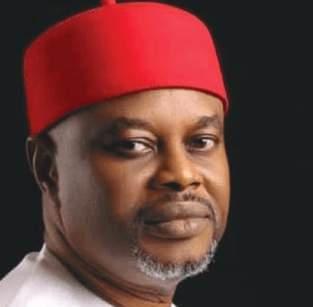
In the astute biochemist, they see a new, principled and large-hearted leader who has faithfully paid his dues and now ripe for higher political responsibility. And this is the seed of Chief Nnaji’s travails. But his coven of traducers badly misread their agile prey because his sheer focus and seething vision spare no hurdles.
It’s against this backdrop that the apparent drab script of alleged certificate forgery was birthed and prosecuted with surprising energy, reportedly enlisting even the respected academia and critical media as foot soldiers. There is more.
A central figure often blamed for the drama to unhorse the Science and Technology Minister’s sterling trajectory is Governor Peter Mbah of Enugu State. Mbah is seen to firmly believe that Chief Nnaji is the sole, powerful rock blocking him from defecting to the ruling All Progressives Congress, APC, which he trusts would provide a solid platform from which to prosecute his second term gover- norship ambition in 2027 – unlike the crisis-riven Peoples Democratic Party, PDP.
Willy-nilly, this curious gaming led to the University of Nigeria denying it winnowed Chief Nnaji in her academic crucible. But this awaits the courts adjudication.
Significantly, in all the drama, Chief Nnaji has consistently made it clear that UNN is his alma mater and he completed the due processes that led up to his degree certification and mandatory national youth service. The related 1985 convocation record is out and in the public domain.
More, the former minister’s succinct press briefing on
Adedayo Adejobi
At its 9th Annual General Meeting, the Compliance Institute, Nigeria (CIN) once again demonstrated why it has become the most important professional body shaping the future of regulatory practice in West Africa. The gathering was more than a ritual of accountability; it was a declaration of ambition, a roadmap for the profession, and a moment of reflection on how far compliance practice has come in Nigeria.
The Registrar and Chief Executive Officer of the Institute, Bawo Egbakhumeh, set the tone with a report that highlighted the extraordinary momentum CIN has built over the past year. Membership, she revealed, had grown by nearly 30 percent year-on-year, surpassing 5,156 professionals drawn not only from Nigeria but also from countries as diverse as Canada, the United Kingdom, Cape Verde and Portugal. Certification numbers, too, had soared. Candidates sitting for professional exams rose by 14 percent, passes jumped by more than half, and the overall pass rate climbed dramatically from 61 to 82 percent.
“The certification pipeline has strengthened, and our pass rate now reflects the growing commitment of professionals to the highest standards of compliance,” Egbakhumeh noted.
“CIN is no longer just building capacity locally; we are building an internationally competitive compliance profession.”
That sense of international reach was reinforced throughout the Annual General Meeting. Over the past year, the Institute has deepened collaborations with institutions such as the Nigerian Bar Association, the Chartered Institute of Bankers of Nigeria, Lagos Business School and the Association of Certified AntiMoney Laundering Specialists. Membership of the International Federation of Compliance Associations has also ensured that Nigeria’s
voice is present in conversations about global best practice. With plans already underway for its maiden Compliance Conference, the Institute is positioning itself not just as a professional body but as a thought-leadership hub for compliance across Africa.
Technology has also taken centre stage in the Institute’s agenda. The Registrar outlined a phased programme of automation and digitisation that will transform the member experience. Registration and payment processes have been automated, exam enrolments will soon generate instant e-certificates, and a points management system will help professionals track their continuous education. Plans for an AIdriven chatbot to engage members are already in motion, while cybersecurity measures aligned with GDPR and NDPR standards are being strengthened. “Digital adoption is not just about efficiency; it is about future-proofing the profession,”
Egbakhumeh explained.
“By 2025, member engagement through online platforms is projected to grow by nearly 20 percent. Our goal is to create a seamless compliance ecosystem, leveraging technology to enhance learning, engagement and accountability.”
But perhaps the most significant development of the past year lies in the halls of the National Assembly. CIN’s long-awaited Charter Bill crossed a crucial milestone in 2024, sailing through its second reading in the Senate and now awaiting a public hearing.
For the President of the Institute, Pattison Boleigha, this is nothing short of a turning point. “Securing the passage of the CIN Charter Bill into law remains our foremost priority in 2025,” he said in his AGM report.
“Attaining chartered status will formally
Monday, October 6, 2025 put a lot matters to rest and especially put the UNN VC on the spot. He proclaimed to the gawking media and rapt Nigerians that he is indeed a proud alumnus of UNN. For good measure, he appropri- ately dismissed his travails as a “politically motivated media trial.” And this why he is standing pretty firm.
In the media briefing held in Abuja, on Monday, October 6, 2025, the former minister stated clearly that he graduated from UNN in July 1985 with a Bachelor of Science degree in Microbiology/Biochemistry, with Second Class (Honours) Lower Division.
“Let me state clearly and for the record: Chief Uche Nnaji is a proud alumnus of the University of Nigeria, Nsukka (UNN), having graduated in July 1985 with a Bachelor of Science degree in Microbiology/Biochemistry, with Second Class (Honours) Lower Division,” Dr. Robert Ngwu, spokesperson to the minister told the audience.
“That fact is not in doubt. It is documented in the University’s own records, acknowledged in its official correspondence, and reflected in its 1985 Convocation Brochure, which remains part of UNN’s permanent archives. We have called this briefing to address the deliberate misinformation recently circulated in some sections of the media regarding the academic credentials of Chief Geoffrey Uche Nnaji.”
Displaying notable emotional intelligence flowing from an awareness that the administration he had served faithfully is steeped in tough governance challenges, he simply took the decision to stand down. The move has ex- pectedly drawn wide ranging reactions. Not many know that Chief Nnaji who brought new, pragmatic thinking to the science ministry, is one of the closest cabinet members to President Tinubu.
Rights activist lawyer, Dele Farotimi, declared Chief Nnaji the most honorable among other members of President Bola Tinubu’s cabinet. In a post on X, Farotimi thumbed up Nnaji for his action. He wrote: “I don’t know him, and I no send am. BUT this guy is more honorable than every other person in the cabinet from which he has ‘honorably’ resigned.
According to an anonymous 19th Century writer, “Failure comes only when we forget our ideals and objec- tives and Principlesprinciples.” are linked to personal growth and values. Forgetting principles can lead to failure. Victor Hugo advised changing opinions but keeping principles, like changing leaves but keeping roots intact. Timeless principles and high standards are seen as necessary guides. Without principles, one is merely “a bag of animal flesh”. Principles translate values into action, preventing a truth seeker from getting lost.
Today, the former Minister of Innovation, Science and Technology, a pragmatic, progressive disruptor, Chief Uche Nnaji, with his resignation has sent a powerful message to both the young impressionable Nigerians and the country’s fractured elite that without principle, there is indeed, no country.Nigerians wait and watch as the lone star from the East hefts his burden of principle.
establish CIN’s role in regulating the compliance profession in Nigeria.”
The practical impact of a charter would be sweeping. With such recognition, CIN would not only certify but also regulate compliance officers nationwide, setting ethical and professional benchmarks across banking, telecommunications, oil and gas, manufacturing and beyond. For an industry still struggling with issues of corruption, weak governance, and regulatory uncertainty, chartered status could help transform compliance into the backbone of institutional integrity.
The Institute has also made strides in aligning its own programs with international standards. Its flagship qualification, the Associate of Compliance Institute, Nigeria, is being benchmarked against the International Certified Compliance Professional standards of IFCA. “By aligning our certification with ICCP standards, we elevate CIN’s credentials to global recognition,” the President affirmed.
“This ensures our members remain competitive and well-prepared to navigate evolving risks, whether in Nigeria or across global markets.” These risks, he reminded members, are not theoretical.
In Nigeria, compliance officers are grappling with an increasingly complex regulatory environment, from anti-money laundering laws to data protection requirements, with corruption and fraud never far behind. Globally, compliance professionals must contend with the rise of digital assets, the expanding reach of sanctions regimes, cybercrime and heightened enforcement of anti-bribery laws.
CIN’s response has been to intensify its capacity-building efforts, ensuring its
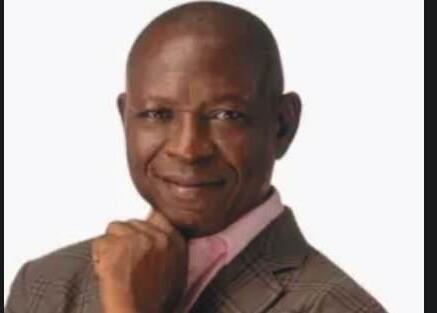
members are not only trained but regularly updated through bi-weekly webinars and sector-specific workshops. Over 700 professionals attended its online sessions in 2024 alone, and courtesy visits to institutions such as the Economic and Financial Crimes Commission have further embedded CIN into Nigeria’s compliance ecosystem.
The challenges are significant, but so too is the vision. As the Institute looks ahead to 2025, the agenda is both ambitious and carefully calibrated. Membership is expected to cross the 7,000 mark before the year ends. The number of certified professionals is projected to grow by more than 40 percent.
In the words of its Registrar, Bawa Egbakumeh, ‘’A website upgrade will anchor the Institute’s digital transformation drive, and revenue is forecast to rise by as much as a quarter, thanks to a disciplined approach to expense
management. At the same time, the Institute is preparing to host its inaugural Compliance Conference and a high-profile induction ceremony in December, signalling its intent to step into the public square as the authoritative voice of compliance in Nigeria.’’
For the President of CIN, the AGM was both a celebration of progress and a challenge for the future. “CIN has become a household name in compliance, but our vision is bigger,” he declared.
“The years ahead must be about deepening our institutional foundations, attaining our charter, and expanding our influence across Africa. Compliance is the language of trust, and trust is the currency of modern business.”
As he spoke, it became clear that CIN’s leadership is united around a shared message: compliance is not a bureaucratic burden but the bedrock of sustainable institutions.
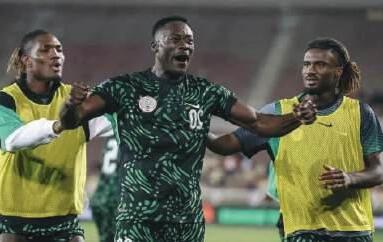
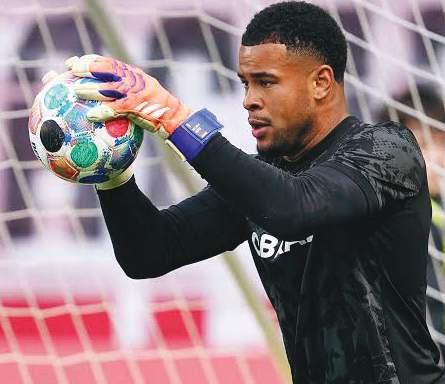
Whenliteraryicon,ChinuaAchebewroteinoneofhispopularnovels-ThingsFallApartthat‘Mother isSupreme’,littledidheknowthatdecadesafter,itwillholdtrueand haveanoverridingeffecteven in Nigerian football circle.Until the acquisition of Stanley Nwabali in the Super Eagles fold,the goal keeping department had been the weakest link of the three-timeAfrican champions.Even at that, recentperformancesoftheSouthAfricanbasedgoalkeeperhasproventhatheisnotthefinaltickof thebox.It’sthereforenotsurprisingthattheNFFeggheadswerelookinginthedirectionofGermanNigerian,NoahAtubolu,withtheformerseniornationalfootballteamPortugueseheadcoach,Jose Peseiro leading the charge to convince the 23-year-old to star for the Super Eagles.With the recent acceptance of invitation to German senior national team,the Freiburg safehand has indeed proved the late literary icon, Chinua Achebe, right that mother is indeed supreme after Atubolu, who was bornofaNigerianfatherandaGermanmotheroptedtoplayforthefour-timeworldchampion
There is no doubt that the weakest link of the Nigeria senior national team, the Super Eagles in recent times has been the goalkeeping department. Indeed, Nigeria’s failure to hoist its flag at the 2022 World Cup in Qatar and the team’s second round exit at the African Cup of Nations in Cameroon was heavily blamed on goalkeeping errors.
The then Super Eagles head coach, Jose Peseiro was already looking in the direction of Nigerian descent’s German Bundesliga, SC Freiburg’s safehand, Noah Atubolu for solution, something the Portuguese admitted then would be a tough task.
However, during the week, Atubolu received his first call-up to the Germany senior national team which is seen as a proud moment for the young goalkeeper, but it also raises uncomfortable questions for Nigerian football.
The 23-year-old, who recently set a Bundesliga record by saving five consecutive penalties, has showcased the kind of composure and talent any national team would covet.
Born to a German mother and Nigerian father, Atubolu has always had the option to play for either country.
Nigeria had expressed interest in the talented shot-stopper, yet it appears the Super Eagles have lost the race.
Former senior national team coach, Jose Peseiro had already hinted at the difficulty of persuading Atubolu to switch allegiance, given his prospects in Germany.
Atubolu recently conceded that he had “no contact with Julian Nagelsmann (Germany Coach)” and was not expecting a call-up to the German national team any time in the near future. It thus came as no surprise to learn that the 23-year-old literally slept through one of the defining moments of his career. Atubolu was catching upon some sleep following his side’s late Sunday Bundesliga away match against Borussia Mönchenglabach. With DFB No. 1 Oliver Baumann struggling with Nausea, Nagelsmann opted to nominate Atubolu on Monday. The Freiburg German-Nigerian, who recently broke a record for consecutive number of league penalties saved was taking a nap after a Monday morning training session when the call came. Atubolu joined Baumann, Augsburg’s Finn Dahmen, and Stuttgart’s Alexander Nübel on the October

international break squad..
“We got home very late on Sunday night after the game in Mönchengladbach and I took a nap after the morning training session,” Atubolu explained in a statement published on Freiburg’s website. “When I woke up, I had several missed calls from national team goalkeeper coach Andreas Kronenberg and SC goalkeeper coach, Michael Müller on my phone. They said the driver would be there soon and I had to leave.
“I’m going to the national team with the expectation of soaking everything up and learning as much as I can,” Atubolu went on to say. “It’s a huge honor for me to be in the German national team squad.”
Atubolu was part of the German U21 national team that finished as runners-up at last summer’s European Championship in Slovakia. He has made a total of 22 appearances for the U21 side.
According to German-based Nigerian journalist, Oma Akatugba, he had a conversation with Peseiro, but the Super Eagles coach and his staff believe it could be challenging to convince him to switch to Nigeria due to his talent and prospects with the German national team.
Akatugba went on to say that Peseiro promised to work on convincing Atubolu to change his nationality, but didn’t appear entirely convinced that the Freiburg goalkeeper would switch his allegiance to the three-time African champions. Atubolu was installed as first choice goalkeeper at Freiburg this season following the sale of Netherlands international, Mark Flekken to Premier League club Brentford.
A Freiburg player for approaching 13 years, Atubolu made his first-team debut during the 2022/23 campaign..
Broad shoulders, a sizeable wingspan and lightning reactions enable Atubolu to pull off some stunning blocks at close quarters. He’s also super confident on the ball, boasts laser-guided distribution and once scored a goal from inside his own half for the Freiburg U17s. “It’s a massive step up from 3. Liga to the Bundesliga, but Noah’s been brilliant. He’s got more talent than I had at his age, “-ex-Freiburg No.1 Flekken had stated. For Freiburg sporting director Klemens Hartenbach, “Noah exudes presence and confidence, and is mastering all the elements of a very good goalkeeping
game.”
In 2019, Atubolu was among the goalkeepers of Nigerian descent that met with erstwhile Super Eagles Head coach, Gemot Rohr during a visit to Germany. Atubolu, who confirmed meeting with Rohr while he was still playing for Freiburg 11 then in the fifth division, said, “I had the chance of playing for Nigeria after meeting with the coach in 2019 and it’s an option I can’t rule out in the future.”
Often compared to German legend, Manuel Neuer, Atubolu’s abilities are not in doubt.. In his first few weeks in the Bundesliga, the 1.89m-tall gloveman has been nominated for the Rookie of the Month award.
Now, with a senior call-up, the door to Nigeria is effectively closing if he takes the field for Germany.
This situation reflects a broader challenge for Nigerian football: retaining dual-nationality players amid growing competition from European teams.
Atubolu’s rise should serve as a wakeup call for the Nigeria Football Federation, NFF, to act decisively and engage with young talents early.

Three-time African champions, Nigeria’s hopes of reaching the 2026 FIFA World Cup are hanging by a thread.
The Africa Cup of Nations runners-up were winless in their first four matches in CAF Group C, with a 2-1 loss to Benin following three consecutive draws, but new head coach Eric Chelle oversaw a morale-boosting 2-1 win in Rwanda, where Victor Osimhen bagged a brace to seal theSuperEagles’firstWorldCup qualificationwinsinceNovember 2021.
Osimhen was on target once morefourdayslateragainstZimbabwe,but a90th-minute equaliser forthegroup’sbottomsidestruck a huge blow to the Super Eagles’ chances of securing an automatic spot at next year’s tournament.
Thosememorieswerestillfresh
against Rwanda on September 6 when, after Osimhen limped off, substitute Tolu Arokodare scoredtheonlygoal.Adrawwith SouthAfricainBloemfonteinleft Nigeriainpotentiallydirestraits, but a FIFAruling against Bafana Bafana may just have offered them some reprieve.
The Sporting News takes a look at what Nigeria have to do to salvage their efforts to reach the 2026 World Cup and their upcoming fixtures.
Can Nigeria still qualify for World Cup 2026?
Yes, Nigeria can still reach the finals to be staged across the United States, Canada and Mexico. They are still outsiders, but the penultimate round of games kept their hopes alive.
The Super Eagles beat Lesotho 2-1 to remain third in the
group, three points behind leaders Benin, who they play on the final matchweek.
Nigeria must beat Benin by two goals to end with a superior goal difference and finish above Les Guepards. If they do that and South Africa fail to beat Rwanda, Nigeria will progress as group winners.
SouthAfrica were in total control ofthegroupbeforebeingeffectively docked three points by FIFA for fielding an ineligible player against Lesotho. Bafana Bafana then drew 0-0 with Zimbabwe to leave the group ultimately in Benin’s hands.
The four best second-placed teams in the nine groups will progress to the inter-confederation playoffs, but Group C has not collectively returned high points totals. It’s most likely win the group or bust it for Benin, South Africa and Nigeria.
Former unified heavyweight champion, Anthony Joshua is still currently contemplating his next career move after his stoppage loss to Daniel Dubois, but his Matchroom promoter Eddie Hearn tells ESPN that he’s been fielding and considering offers to fight in both Ghana and Nigeria before he looks to target a long awaited fight with Tyson Fury in 2026.
The current names being floated as potential opponents for a Joshua fight in Africa include both Martin Bakole and Deontay Wilder, the latter of which was a
huge fight to make years ago but never could quite come together, and both Wilder and Joshua’s stock have both dropped considerably since that time.
”We have had an approach from Ghana, and now Nigeria. I think AJ fighting in Africa would be incredible.
“If he fights again in February or March, he will have been out of the ring for 18 months. It’s a huge amount of time to come back versus a top 10 heavyweight but also it’s Anthony Joshua and you have got these big site deals so you
can’t just fight some random geezer who is ranked 100th in the world over eight rounds. If he wasn’t Anthony Joshua, you might actually do that but it’s very difficult to do that in his position.”
Despite the offers on the table, Hearn insists that a showdown with Fury is their top priority, although it’s almost impossible to determine what the mercurial Fury will end up doing, as he’s announced his retirement from the sport of boxing time and time again, with him recently saying the last time was for good. Take that with a grain of salt, of course.
Former Super Eagles captain, SundayOlisehhasplayeddown Arsenal’s chances of winning the Premier League title this season,questioning the winning mentality of both the team and their manager, Mikel Arteta.
The Gunners currently sit top of the Premier League table with 16 points from their opening seven matches, one point ahead of second-placed Liverpool.
Despite their promising start, Oliseh believes Arsenal are not favourites to win the Premier League.
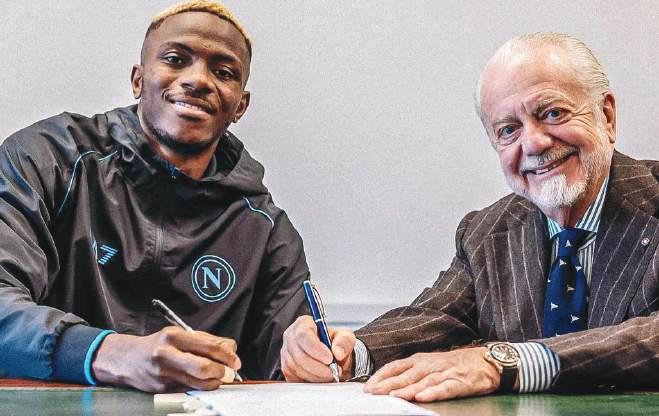
Super Eagles striker, Victor Osimhen has disclosed that he was pressured into joining Napoli in 2020 despite his reluctance, describing the move as one of the most difficult moments of his career.
Speaking to prosecutors, Osimhen revealed how his then-agent and Lille hierarchy pushed him into signing for the Serie A club while he was preoccupied with his father’s deteriorating health.
“The agent I had before told me that Napoli had serious interest, but he was only interested in my transfer, whereas my mind at the time was entirely on my father’s health. I just wanted to know how he was doing,” Osimhen said in documents made public this week, as per Football-Italia.
Osimhen’s €75 million switch from Lille to Napoli made him Africa’s second most expensive footballer at the time, only behind Nicolas Pépé’s €80m move to Arsenal.
The deal drew intense scrutiny in Italy, with prosecutors alleging inflated valuations and hidden payments, claims Napoli and their
President of the African Table Tennis Federation (ITTF Africa), Wahid Enitan Oshodi, has expressed high expectations for this year’s ITTF-Africa Championships, citing the impressive form and quality of players set to compete.
president Aurelio De Laurentiis have consistently denied. Though the sporting investigation was dropped, Italian financial authorities are still examining the case.
The Nigerian forward, now starring for Turkish giants, Galatasaray, painted a deeply personal picture of the events surrounding his transfer.
Osimhen described feeling manipulated and emotionally drained during a period marked by family tragedy.
“Following my father’s death, I was very angry with both Lille and my agent, because I didn’t get to see him before he died,” he said.
“They had even told me I had to leave the day after for Naples, without even giving me time to deal with the death of my father.”
Despite his grief, Osimhen travelled to Italy ‘out of respect for the Lille President.’ He recounted meeting Napoli coach, Gennaro Gattuso and club owner, Aurelio De Laurentiis, but said the language barrier and confusion over contract details left him uneasy.
“He asked me if I had seen the
contract yet, but I hadn’t received anything. When I got back to the hotel, I asked my agent if I could see the contract, but he said he didn’t have it. I was stunned, because the President told me that he did,” Osimhen explained.
“Eventually, he showed me a piece of paper with some pseudoagreement with Napoli. I got angry and wanted to return to France. I asked Lopez for a week to rest and went to Paris. Once I returned to Lille, I decided to break off my working relationship with that agent.”
Determined to take back control of his career, Osimhen later turned to another representative, William D’Avila, to finalise the transfer.
“Seeing that Napoli really were interested, I asked William D’Avila to take care of my transfer. Towards the end of July, I signed the contract in Lille, in the presence of Maurizio Micheli for Napoli, and amongst others D’Avila, Lopez, Ingla, Calenda and Cros,” he said. Osimhen went on to become one of Napoli’s most influential players in recent history, leading the club to their first Serie A title in over three decades in 2023.
the mentality of winning is something that you build,” he added.
“All these teams are vying for the title because Man City is struggling. That’s the only reason and that’s why they are all making noise,” Oliseh said on YouTube.
“That’swhyyoucanhearany other team, Arsenal, Chelsea, saying we are going to win the title.”
Oliseh, however, argued that Arsenal lack the championship mentality required to go all the way, insisting that winning is a habit developed over time.
“The problem withArsenal is the fact that Elephants don’t give birth to crocodiles. Winning or
The former Nigerian international suggested thatArsenal and other top clubs are only confident because of City’s current struggles.
Former Super Falcons head coach, Randy Waldrum has been named to the United Soccer Coaches’ 2026 Hall of Fame Class.
It is a fitting tribute to a man whose coaching career has spanned continents and decades.
The American tactician, who led Nigeria’s women’s national team from 2020 to 2024, joins Craig Ewing,Al Miller, and Steve Sampson in a distinguished class that will be officially inducted at
Waldrum
TheformerJuventusandAjaxstaralso cast doubt on Arteta’s ability to lead the London side to glory, pointing to his limited success as a player.
“I have no beef against Arteta but sometimes when I look at him I ask myself this question as a player how many titles did he win?”
Arsenal had come close to ending their long title drought in recent seasons but ultimately fell short, finishing behind Manchester City and Liverpool.
The North London club will be hoping to maintain their early momentum and finally reclaim the Premier League crown for the first time since the 2003/04 ‘Invincibles’ season.
the United Soccer Coaches Convention in Philadelphia in January 2026. Waldrum’s name resonates strongly in both American and Nigerian football circles.
While serving as head coach at the University of Pittsburgh, he took on the challenge of managing the Super Falcons, one of Africa’s most successful women’s national teams.
Under his guidance, Nigeria reached the Round of 16 at the 2023 FIFA Women’s World Cup
before bowing out to eventual runners-upEngland.Healsoguided the team through the 2024 Summer Olympics, where Nigeria advanced from the group stages.
His first major test came at the 2022Women’sAfricaCupofNations in Morocco, where Nigeria finished fourth.Despitethatdisappointment, his tenure would prove transformativefortheteam’sstructureandstyle.
Waldrum’slegacyinNigeriagoes beyond results, it lies in the players he discovered and developed.
Oshodi commended the Tunisian Table Tennis Federation (FTTT) for stepping in to host the tournament following Rwanda’s late withdrawal, praising their dedication to the sport and their experience in organising top-tier events.
He also expressed excitement over the strong presence of young talent at the tournament, which will take place in Tunis from October 12 to 19. The event serves as a qualifying competition for the 2026 ITTF World Team Table TennisChampionshipsinLondon.
“There’s no doubt this year’s
tournament will be fiercely contested, especially given the current form of our players and the emergence of talented youth athletes,” Oshodi said. “We’re particularly thrilled that many junior players who featured at the recent Youth Tournaments in Lagos have earned spots on their national teams for Tunis. This shows they’re maturing and ready to challenge the veterans. This will give us a chance to see the levels of improvement in their play over the last year. I expect upsets in Tunis and look forward to seeing some of these young stars rise to the top.”
He added, “We must also acknowledge the experience of our established players, which will make the tournament even more exciting.. The atmosphere in Tunis will rival any global event.
Tunisia is a seasoned host with a strongtrackrecord,andwe’reeager
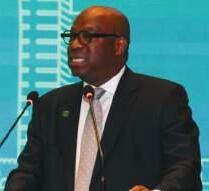
for the tournament to kick off on October 12. The highlight for many teams will be the team event, which doubles as a qualifier for the 2026 ITTF World Team Championships in London.”
The2026editionwillcelebratethe centenary of the sport, returning to thecitywhereboththeInternational Table Tennis Federation and the first World Championships were founded in 1926.
The Nigeria Rugby League Association women’s national team, the Green Falcons, is ready for their second battle in a twogame friendly series against the Leopardess of Ghana, at theAlaro City International Rugby Pitch, Lekki, Lagos State.
The Green Falcons defeated the Ghanaian ladies with a dominant 40-0 scoreline in the first test game.
Lauretta Bayere and Faustina Akeje combined for two tries each to lead the Nigeria Rugby League Association women’s national team, the green falcons, in tries.
Adaeze Innocent registered 1
try and 3 conversions for 10 points to stamp the Green Falcons’ domination in the game.
The game serves as preparation for the Green Falcons’participationin theinauguralWorldSeries,wherethey will face Ireland for a place in the 2026 Women’sRugbyLeagueWorldCup inAustraliaandPapuaNewGuinea.
Speaking on the team’s readiness, Isah LS, the general manager of the Nigeria Rugby League Association, revealedthatpreparationsareinthree phases to ensure holistic planning and execution.
“We are currently in camp, and we had our first friendly against
Ghana, and the second is coming up on the 11th. We have broken down the training into three sections to ensure we are effective in all sections. First was to iron out any frictions, the one we are working on now will be tested at the weekend in the second game.”
Nigeria’s Green Falcons are the current Rugby League champions of the Middle East and Africa. Canada will host Fiji, Ireland, and Nigeria in the inaugural World Series to determine the final spot for the 2026 Women’s Rugby League World Cup inAustralia and Papua New Guinea at the end of next year.
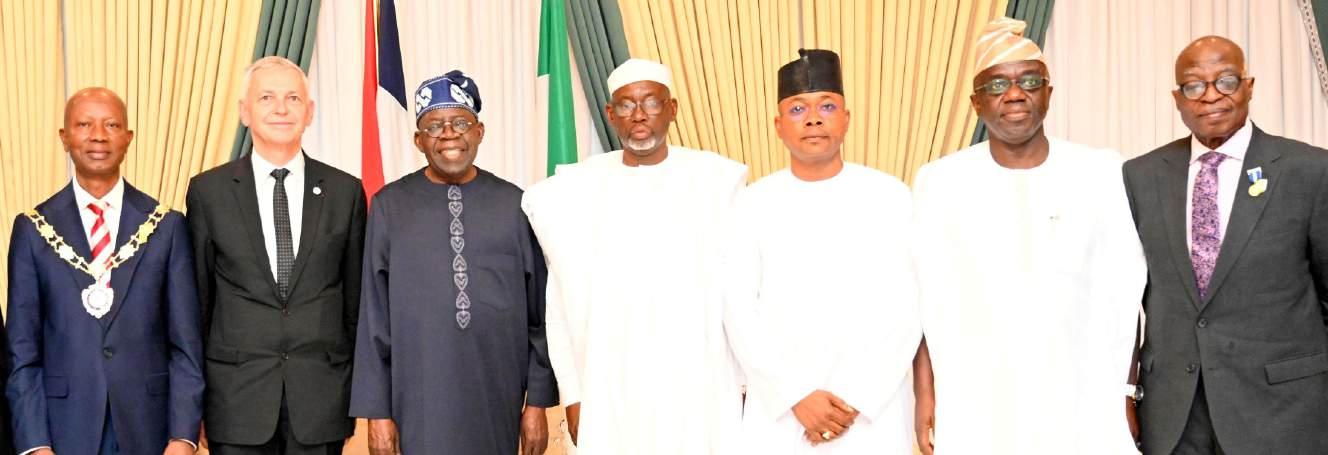
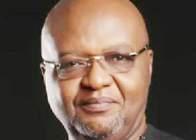
Should a leader write a book about his party’s performance while still in office? Whichever way the answer goes, one thing is clear: Anyone in public office who dares to give a long narrative about an ongoing tenure must be so sure of his ideas, performance and trajectory that he has the courage to put is all down in writing and dare anyone to prove him wrong. On the other hand, the person may actually also be on an ego trip, and would put out materials that say only nice things about his party and his people. But the matter is rather different in a book by Governor Hope Uzodinma of Imo State. He said, in the Introduction to his book, A Decade of Impactful Progressive Governance in Nigeria, that idea of writing
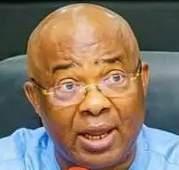
a book about his political party came to him on the day the party defeated the PDP in the 2015 presidential elections. The
idea got further, and very rousing, fillip more than eight years later; when he was asked to deliver the inaugural address at the launch of the Progressive Institute of Nigeria.
As he notes in the book: “In the course of preparing for the address, it struck me that many of us in the APC may not even be conscious of the ideals which the party stands for”. Thus, the book he then went ahead to write, which is the subject of our discourse today, is the result of a genuine desire to provide factual political and historical material to members of his party; and to Nigerians in general for the purpose of serious political education.
This makes Governor Uzodinma’s book a deliberate presentation of his perspective on the successes of his party and, by extension
and implication, also his own trajectory as a governor within the fold. It brings out the gains anyone can speak of under the current APC government, within and outside Imo state.
He took a total of 372 pages to lay it all out, deploying ten chapters, a well-crafted Epilogue and a 17-page bibliography in the process. The examples and data supplied in the book are verifiable. The political insights and lessons presented are poignant. The simple language and delivery make the book an un-stressful read.
Which is really not common with “political” writings in Nigeria today. The writers of such works often take a lot of trouble to complicate simple
Continued on page 27
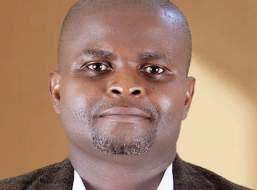
During President Bola Tinubu’s working visit to Abia State a few days ago, the Deputy Speaker of the House of Representatives, Hon. Benjamin Okezie Kalu, the country’s number six citizen, made some remarks that betrayed a troubling ignorance of the workings of Nigeria’s federal structure and the constitutional principles guiding revenue allocation from the Federation Account.
The President, who was represented by the Minister of Works, Mr. David Umahi, inaugurated projects undertaken by the State Government in Umuahia and Aba, respectively.
In his speech at the ceremony, Kalu, who is one of the leaders of
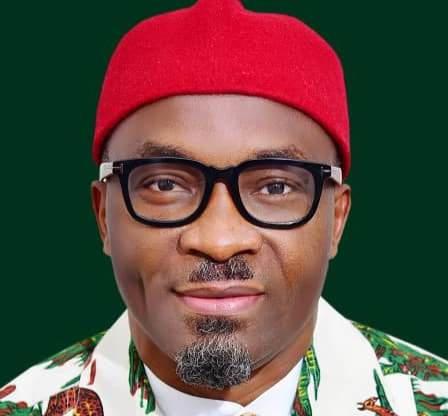
the legislature, an independent arm of government whose role is to oversight the executive, displayed a disturbing misunderstanding of legislative duty. Hear him: “As a leader in this country
and as a citizen of Abia, I want us to be very vocal in praising the President of the Federal Republic of Nigeria, on how he has made resources available to the States. When he removed oil subsidy, he did not keep the money in Abuja, but he sent it to the States.
“So, it is my challenge to the Commissioner of Information and all the media houses in Abia State, to please give credit to whom credit is due. The one that the President has done, make sure that Abians know that our President is supporting his friend, the Governor of Abia State. If we need more from the President, we must give credit to the President so that he will release more to Governor Otti, to do more for Abia State.”
It is worrisome that a high-ranking
lawmaker, who should know better and who a lot of Nigerians look up to, will hold such an opinion. Such statements from persons like Benjamin Kalu, completely reduce a constitutional role to an act of benevolence from President Tinubu, when it ought not be so.
For better understanding, the Nigerian government's financial system operates a structure where funds flow to the three systems of government from the Federation Account. The Federation Account serves as the central pocket through which the Federal, State, and Local Governments fund developmental projects, as well as maintain their respective workforce and meet their
Continued on page